

5 Steps To Setting Up Your Property Sourcing Business Legally and Properly
Setting up your property sourcing business to be compliant can be a lot of work. Read our Ultimate Guide to Property Sourcing & Deal Packaging first so you can avoid the unnecessary expense of going the compliant route.
If you’re thinking about setting up a property sourcing business, one of your biggest concerns should be how to set up your business legally and properly. If you don’t get this right, there could be consequences to your business and to you individually as the business owner. So before you start doing any business, make sure that you’ve gone through the appropriate legal steps.
To help you, I’ve listed the 5 most important factors in ensuring your property deal sourcing business is set up correctly:
1. Setting up as a property sourcing business
The first thing to think about is whether your business is in fact, a property sourcing business. If you’re purely sourcing properties for yourself, rather than packaging and selling on for a fee, you don’t have to set up a sourcing business. If you’re going to be a property sourcing business, you will need to have all of the relevant legal checks in place.
2. Registering with HMRC and Regulators
The property industry is highly regulated to protect all parties that are involved in property transactions. Property deal sourcing comes under the same category as estate agents in terms of governance, so we have to work by the same rules.
You must register your business with HMRC in the correct way, so select the relevant set up such as limited company, sole trader or limited liability partnership.
The property industry is governed by three separate ombudsman schemes, which offer independent bodies for customers to raise complaints through. This would happen if the customer wasn’t happy with the way that you dealt with their complaint, so the ombudsman is the next stage of escalation.
The three property ombudsman schemes are: Ombudsman Services, The Property Ombudsman (TPO) and the Property Redress Scheme (PRS). Property deal sourcers must be members of one of these schemes. Goliath Property Solutions are members of the PRS, which costs around £95 plus VAT each year.
3. Register for Anti Money Laundering Legislation
Criminals often use the property industry to launder money. If you’re not familiar with the term, money laundering basically means that they try to hide the money that they gained through criminal activity by using what looks to be legitimate methods.
Property sourcing businesses must be registered with HMRC for the Anti Money Laundering Legislation. This means that any suspicions of such activities must be reported and you can be subjected to fines if you are deemed to have not taken appropriate action.
4. Taking out Insurances
Setting up the correct types of insurance will protect you from potential issues such as being sued. In the property industry, where large sums of money are involved, this is more common than you might think. For example, you may find yourself in a situation where investors try to sue you for what they perceive to be giving incorrect information on a deal. If you take out the correct types of insurances, you will protect yourself from this.
The two types of insurances we have as brokers, are professional indemnity insurance and public liability insurance. It is really important that you get these set up, ours costs around £500 per year for the combined policy.
5. Register under Data Protection Act
We also have huge responsibilities in regards to data protection. We are holding lots of personal information about buyers, sellers, landlords etc. and we are responsible for protecting that information. Property sourcing businesses must register under the Data Protection Act with the Information Commission Officer. This only costs £35 per year and is really important.
We’re not trying to scare people but property is an industry where you must comply with all the regulations and register and set up correctly. Missing anything out could lead to huge consequences; look at what happened with PPI/miss-selling etc. You really do need to ensure that you dot all of the i’s and cross all the t’s when it comes to setting up a property sourcing business.
Ensure you’re set up correctly by downloading our free ‘Property Deal Sourcing Business Setup Checklist’ below.
FREE RESOURCES:

© All Rights Reserved Mark Dunsmore
PRIVACY POLICY | TERMS & CONDITIONS | DISCLAIMER
You are using an outdated browser. Please upgrade your browser to improve your experience.
- February 25, 2019
- — Property Market Insights
CASAFARI’s Property Sourcing: A How-To Guide
- Property Sourcing
Most countries in the world suffer from the same problem: chaos, a lack of access to public records when it comes to real estate, making navigating the property market a non-straightforward process. Not only are homebuyers, owners and rents lost, but it also means that the professionals of the sector operate without essential real estate data to help them streamline their work and advise their clients.
Which is why the Property Sourcing is one of the most central products of CASAFARI: it accomplishes our mission to solve chaos and bring transparency to the property market by aggregating millions of listings from thousands of sources every day.
See which features of our Property Sourcing allow you to have access to the largest real estate database in Europe.
Property Sourcing: an improved experience for your property search
What we’ve learnt from real estate professionals is that staying updated on daily market activity is a time-consuming process, involving multiple internet tabs open on dozens of online sources. Well, not anymore!
CASAFARI Property Sourcing is a centralised information on the entire property market. This application is designed for you to be able to quickly:
- source new properties and find market opportunities;
- track your own portfolio and identify exclusivity breaches;
- monitor the activity of competitor agencies;
- prepare for meetings with clients thanks to the access to all past information about a property;
- grow your portfolio with FSBO leads.
Improve your property sourcing and find the perfect place for your clients
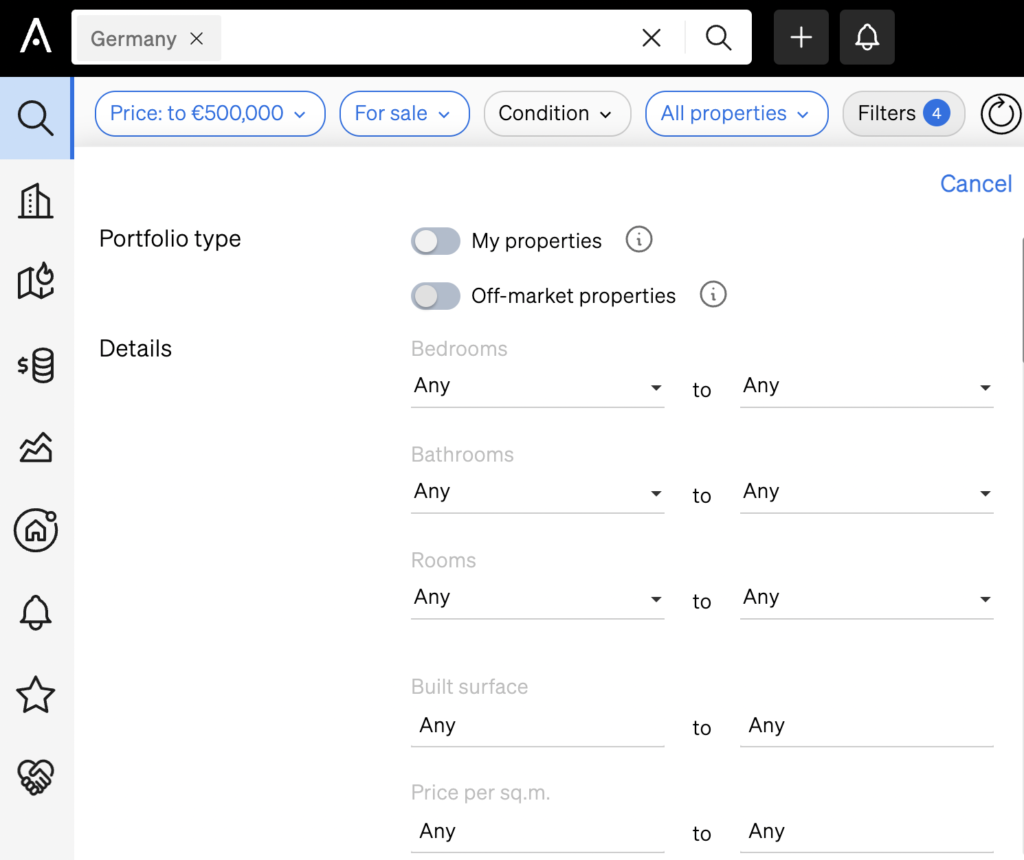
You can search by tenths of filters to find the property that matches the exact needs of your client or the market information needed for your daily tasks. Some of the filters offered on our Property Sourcing are:
- Price range and type of business (rent or sale);
- Condition of the property (new, very good, to refurbish, new);
- Amount of rooms;
- Year of construction, energy certificate, and built surface;
- Property type (house, apartment, studio, building, plot, office, etc.);
- Characteristics (balcony, elevator, garage, swimming pool, etc.);
- Who’s listing it.
Setting Alerts for recurring property searches
But let’s say you’re on the look for a specific type of property for a client, something that’s not that easy to find. You certainly wouldn’t want to run the same search everyday, right?
Worry not, we’ve got you covered! Inside Property Sourcing you can set Alerts and get notified every time a new property that matches your criteria is put on the market. You only need to click on the bell icon beside the search engine.
Gather more property leads with CASAFARI: get to know Alerts
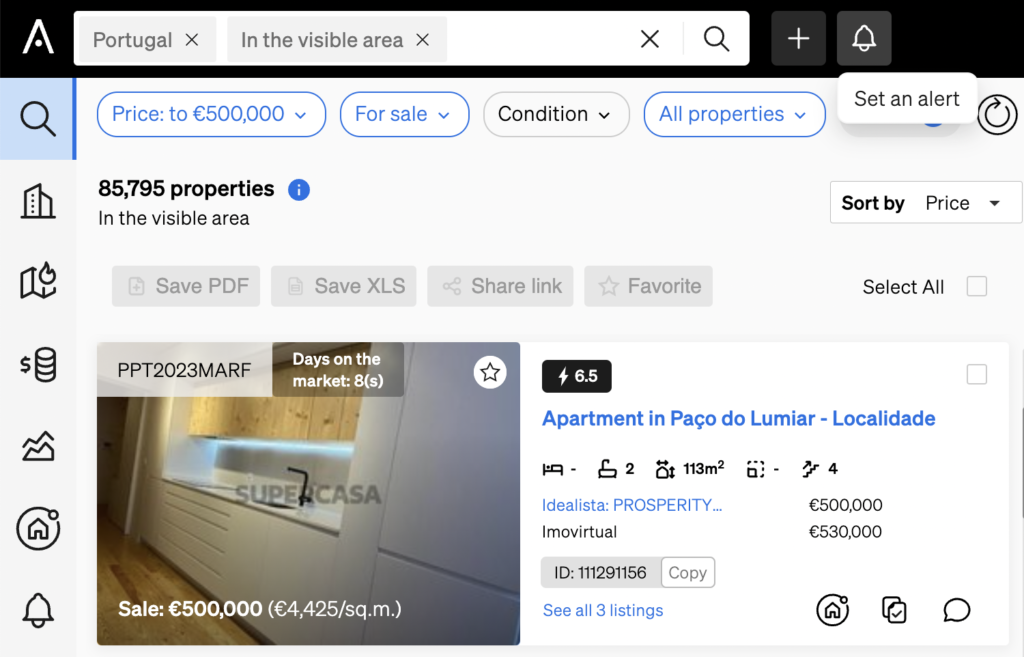
Search by reference
Every real estate listed online has a unique reference number that you can input in the search engine of CASAFARI Property Sourcing. The property will appear instantly and, if you want to stay updated with it, you simply have to add it to your Favourites (more on that later!).
This feature is useful to keep track of what’s in your portfolio and your competitor’s without having to manually scroll through all that’s available on the market.
HOT OFFER and NEW labels
Inside CASAFARI’s Property Sourcing you can see labels that help you identify new properties put on the market and hot opportunities that are available for buyers.
These labels are meant to give you a competitive edge, whether it’s helping you act fast on competitive markets or making your property
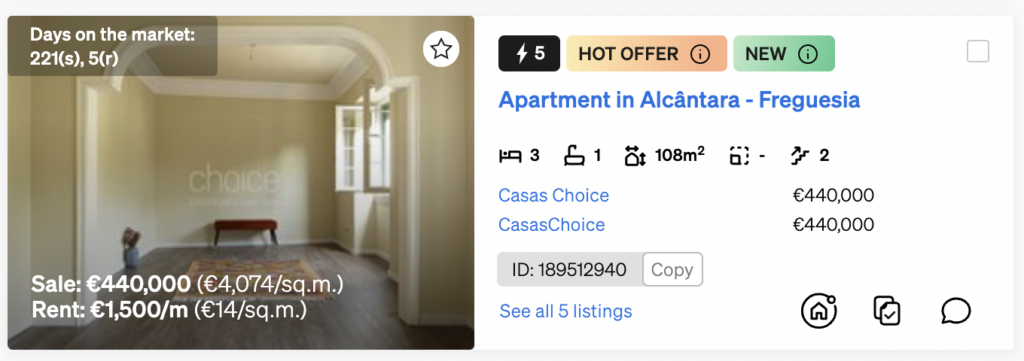
Ratings for properties
The properties shown inside our search engine also go through our scoring system, in order to help you select the most interesting properties available and quickly evaluate their desirability . Take a look and see which factors are taken into account to provide these ratings!
NEW: Labels and scores for the best market opportunities
Property page: detailed information about each property
You can click in each real estate found inside CASAFARI Property Sourcing to see detailed information about it. Here’s a list of what you can find inside a property page:
- All the characteristics of the property (amount of rooms, size, energy certificate, etc.);
- Photos of it;
- See graphs about how’s the market for properties such as this one;
- How long it’s been on the market, for how much and who’s listing it;
- Recent price changes;
- All the property history since it was first put online.
Property history: why is this data priceless to real estate professionals
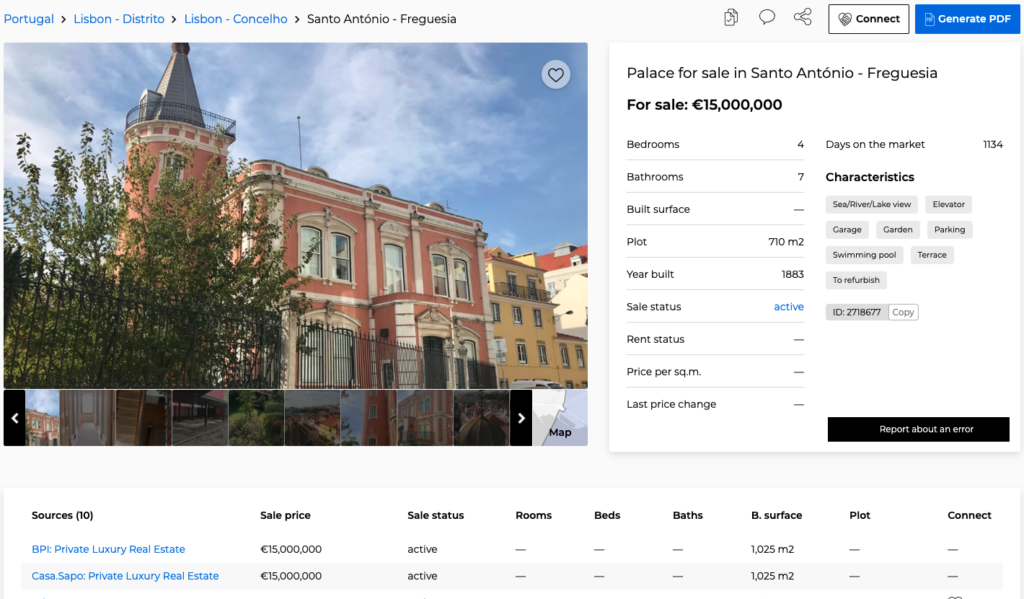
You can also add comments for you or your colleagues, share the property through a message, email or generating a PDF, run a property valuation for it and propose a shared deal with a seller agent.
With this data on your hands, it’s your move! You’re able to:
- Identify exclusivity breaches;
- Understand how the property is positioned in relation to its competitors;
- Strategise how to approach a seller or how to sell the real estate;
- Reach out to other estate agents shared deals.
After all, closing deals is all about keeping your market knowledge updated, right?
Favourites: keep a close eye on what interests you
And since we spoke about the Favourites, you should know that you can check all changes that go on with properties that are interesting to you or your clients . This is useful to:
- Monitor interesting assets that decrease in price as a buying agent or property investor;
- Make informed decisions about selling real estate assets by keeping track of their competitors;
- Monitoring your portfolio as an estate agent or broker, identifying exclusivity breaches or competitive disadvantages.
How to benefit from CASAFARI’s Favourites folders
The process of adding a property to your Favourites is very simple: you simply need to click on a star icon found on the photo of a property inside Property Sourcing. Easy, right? You even get to choose in which folder you wish to add said property, for organisation purposes.
And, finally, in the Favourites section of your CASAFARI real estate software, you can see all the changes that happened to the properties you saved in the last day, 3 days, week or month. You will be able to see:
- Which properties increased or decreased in prices;
- Which were reserved, delisted or sold.
This helps you keep track of potential opportunities or changes that might be useful to you.
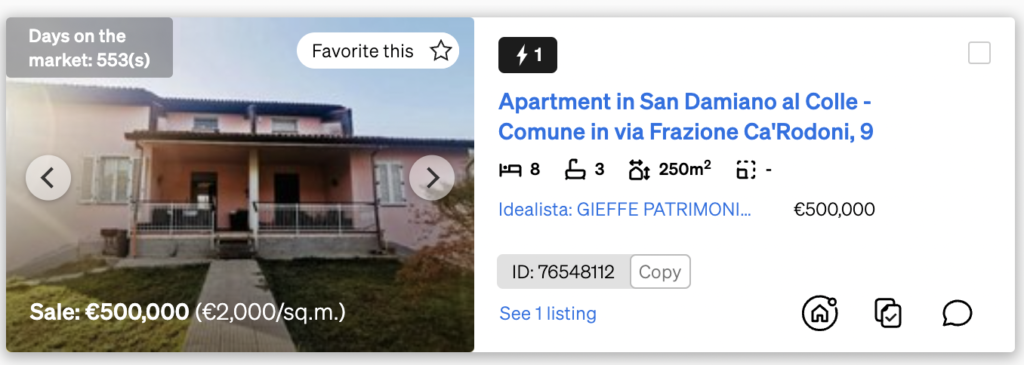
CASAFARI Connect: partner with other estate agents to close deals faster
CASAFARI Connect is a platform that allows estate agents to collaborate in shared deals, splitting commissions in an easy, safe, and transparent way. With CASAFARI Connect, you can:
- Easily manage your requests for shared deals, sent or received;
- Establish flexible rules for commission splitting;
- Gain more visibility to your property portfolio;
- Increase your lead generation and seal deals faster.
How CASAFARI Connect boosts property deals and who is it for
Inside CASAFARI Property Sourcing, you can identify the properties that are available for a shared deal with the handshake icon.
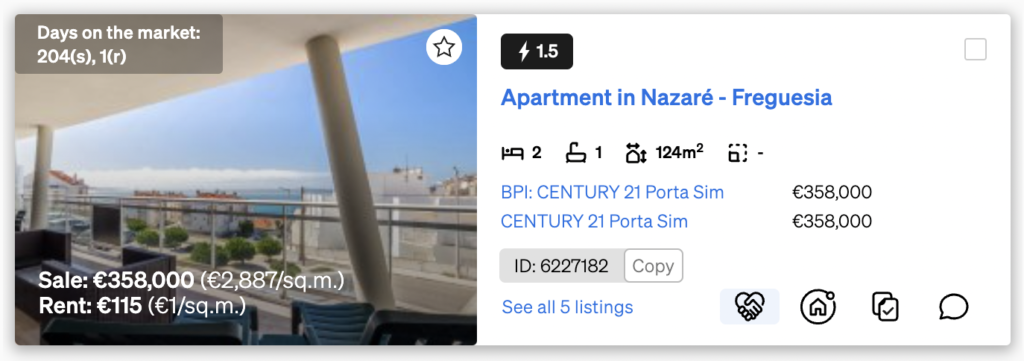
You can opt to click on the handshake icon directly on your property search, which will allow you to check which commission sharing rules apply to this real estate, or you can do it with the “Connect” button, on the top right corner of the property page.
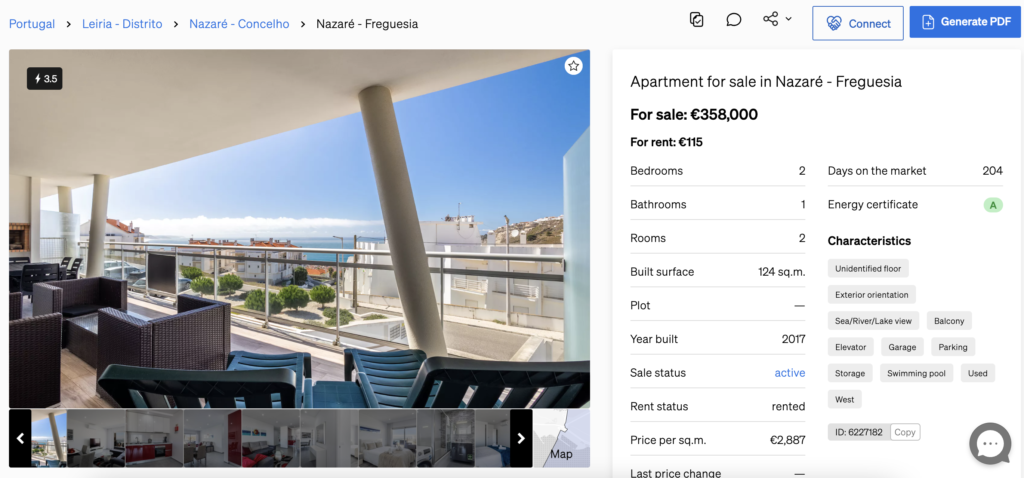
Interested in knowing more about CASAFARI Connect and how you can benefit from it as a buyer or seller estate agent? Here’s all the information you need!
Step-by-step: how to use the new CASAFARI Connect
Real estate commission sharing: build flexible rules in CASAFARI Connect
Are you ready to have all the market data you need in your hands? CASAFARI boosts your deals with up-do-date and thorough information that will put you one step ahead of the competition. Waste no time and subscribe!
We track daily over 310M listings across Europe

The work of JamesEdition in the luxury real estate market
Perlin Gentil, the Head of Sales of JamesEdition, talked to CASAFARI about how the luxury real estate market is since 2020 and what the luxury customer looks

The buyer’s agent work and how to qualify a buyer
Since buyer’s agents work in a commission-based business, it’s crucial to quickly identify which leads show the potential to become a real client so you prioritize them

DoveVivo: capillarity of data and their choice for CASAFARI
When the DoveVivo Group was looking for a partner to power their lead generation for real estate across all countries they work in, a shared investor presented

Engel & Völkers Costa Adeje: data-driven advices for clients with CASAFARI
A tool that allows estate agents to access in-depth and matter-of-fact analyses of the property market. It could be the description of CASAFARI, but it’s actually what

How can climate change affect the property market
Severe floods across Europe causing damages in 10 different countries including Germany and the UK in 2021, wildfires getting increasingly common in Spain, Portugal and France, the
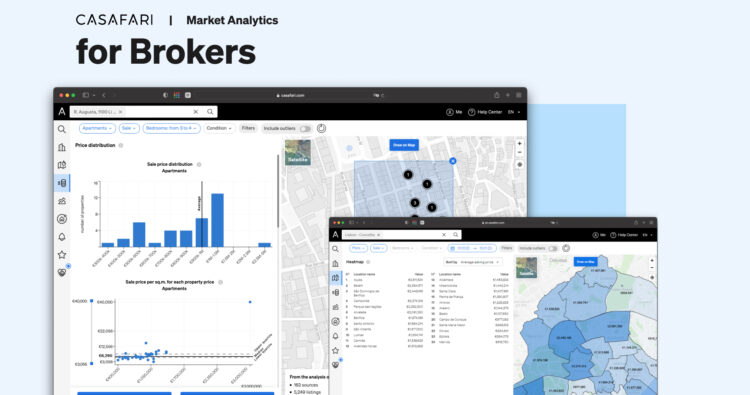
Real estate brokerage: 4 ways in which Market Analytics boosts your business
Sell more properties, challenge the competition, expand the business and improve the credibility of your brand: brokers are always looking for new and better ways to enhance
How to Create Property Management Business Plan [Free Template]

Shannon Hurlman
Sales Manager - Second Nature

There are as many different perspectives on property management business plans as there are different PM businesses. But one thing holds true – in the classic adage usually attributed to Dwight D. Eisenhower – it’s not the plan that matters so much as the planning .
Outlining a detailed business plan isn’t just important for defining your own goals, it’s key to communicating those to potential clients and investors. It also requires deep insight into what residents want and are willing to pay for.
Whether you’re new to property management, have been managing properties for years and are ready to start your own business, or own property management business but are looking for greater investment, we’ll cover important topics to address business plan creation.
We’ll explain why business planning can be so important, as well as who to target with your plan. We’ll also share a free template to get you started.
Key Learning Objectives:
- How to identify and find your ideal clients
- How to articulate your value proposition
- What to include in your business plan
- How to outline your business plan
- A free property management business plan template
Meet the Expert: Peter Lohmann , CEO RL Property Management

What to Know before Creating a Property Management Business Plan
Not to get too deep down the rabbit hole, but the first step to creating a high-quality business plan is – you guessed it – to make a plan for the plan. For entrepreneurs, planning is the key to success.
Going through the following steps first will make the process much easier and more effective in the long run. Here’s what you need to get clear at the outset.
State Laws governing property management business
As you know, each property management company’s approach is very dependent on regional or state regulations. Before taking any steps to either start or change your business, you need to have a clear understanding of the local laws governing your business venture.
We highly recommend hiring an attorney who can help you navigate those laws and regulations.
Who are your ideal clients
Lohmann lays out three critical steps to crystalizing a successful business plan:
- Identify your ideal clients.
- Articulate your unique value proposition for those clients.
- Go out and find leads.
So, first: Who are your ideal new clients?
“Get really clear on who your ideal customer is,” Lohmann says. “Are you managing associations, office buildings, big apartments, single-family rentals, etc.? The narrower and more specific you can be, the better your life is going to be and the more money you’re going to make.”
In other words, anything outside of this target market is going to be a waste of your time. That’s why this is the first step.
“The more narrow and specific you can be here, the more directly you can speak to your prospects in a way that’s compelling,” Lohmann says. “Everything becomes easier – content strategy, sales conversations, even operations become easier – if you know who you want to manage for and what types of properties you want to manage.”
What type of property management company you are
The next step is to identify your unique value proposition. There are tons of property management companies out there. Why should your ideal client choose you?
In Lohmann’s words: “Your second step is to ask, ‘Why should anyone care?’ Property management isn’t a new concept; there are tons of property managers. So, identify what your unique value proposition is.”
This is key to figuring out not just who to pitch to but how to pitch to them.
“What are you going to talk about?” Lohmann says. “You can’t just say, ‘Oh, hire us, we’re the best!’ You need clear examples that say, ‘Our company does something a little different.’”
For RL Property Management, that started as a promise that they would never charge a leasing fee.
“Sure, it’s kind of crazy, and I don’t know anyone else who doesn’t charge that, but it worked,” Lohmann says. “We were trying to figure out why everyone hated their property manager. And we decided that it might be an incentive problem where the property manager’s incentive is to fill the unit as quickly as possible so they can get that big leasing fee, and that was creating bad outcomes for property owners. So we decided that we weren't going to charge a leasing fee, and we've stuck with it ever since.”
How to find your ideal clients
The third and final step of preparation is to identify where you need to go out and find leads and engage property management marketing .
“Given what you know about how you defined your ideal prospect and your company and what they offer, the next question is where you go and get these leads,” Lohmann says.
“A lot of property managers start with this third step. They just say, ‘How can I get more leads?’ But that’s the wrong question. Why do you deserve those leads? Answer that first. Downstream of that is ‘Where are those people hanging out, and how can I get this to them?’”
Getting this step right involves researching property management and real estate property in your area and getting familiar with industry news, conferences, and listings.

What should a property management business plan include?
Now, let’s talk about the actual outline of your PM business plan. If you’re starting a new business and aiming to present a business plan to investors, or even business partners, you should outline each section below as a presentation deck. The information presented in this section needs to read like it is designed for investors and should highlight key terms and concepts they care about.
Here’s a sample property management business plan outline, followed by a detailed explanation:
Executive Summary
Company overview, market analysis (industry, customer, and competitive analysis).
- Marketing Plan & Sales Strategy
Operations Management
Management team, financial plan .
- Growth Opportunities
This is a high-level overview of your entire presentation. As such, it should be the last section that you write. You want to be concise but interesting and hook the reader quickly. Outline the following in broad strokes:
- The type of property management company you are operating
- Your target market
- Your objectives
- Your plan for meeting these objectives
The company overview will dive deeper into your property management niche and business model. Explain what types of properties you manage and how you operate. Options include single-family residential property management (SFR), multi-family property management (MFR) or residential apartments, HOA management, and commercial property management.
Give a brief history of your company and your legal business structure. Other important information might include:
- Your key competitive differentiators and core competencies
- Your metrics for success
- Your management team
- Financial details
- Mission and vision statements
This section benefits you almost as much as it does your audience. Researching for this section will help you more deeply understand the industry, customers, and competition.
- Industry analysis should include details on the trajectory of the market, its size, and key trends, along with challenges and opportunities.
- Customer analysis should include details about your target customers, their wants and needs, etc.
- Competitive analysis should outline direct competitors (PMCs in your area) and indirect competitors like in-house managers, automated tools, etc. Explain why your value proposition is unique. Ideally, present a thorough SWOT (strengths, weaknesses, opportunities, threats) analysis.
This section should describe the property management services the company plans to offer, such as leasing, maintenance, and rent collection. Depending on the jurisdiction, legal compliance and documentation services may be relevant as well. This section should also discuss the pricing strategy for these services.
This section should describe the company's marketing plan and sales strategy, including how it plans to attract and retain clients. It should also discuss any advertising or promotional campaigns the company plans to undertake. Promotions could include paid advertising in print and on websites, social media marketing, radio advertising, SEO marketing, and more.
Here, it’s important to document your marketing channels (organic online, targeted online, print advertising, professional networking) as well as ongoing sales and marketing programs.
Outline your short-term processes and long-term business goals, as well as estimate day-to-day operations. What property management software are you using in the business? What bottlenecks slow down work that’s moving through the organization? How will you structure your company and your teams?
It may also be helpful to include details on critical process workflows, risk mitigation strategies, and technology integrations and updates.
Outline your management structure and the skills and experience of your management team. You’ll particularly want to highlight property management and real estate experience. This is a key moment for you to consider who you have in the company, who is a right fit, and who needs to be looked at as not a great fit.
This is where you give your financial projections and approach. Outline your major cost centers and revenue drivers. What management fees are you going to charge? You should include a profit and loss statement, balance sheets, and a cash flow statement.
Growth Opportunities
Identify and outline the most targeted growth opportunities for your business right now and over the next five and ten years. Knowing your long-term goals requires you to gain a deep understanding of the real estate and property management market in your area and to understand clearly where you fit in and how you can generate growth and value for years to come.
Typically, in this section you might include:
- Expansion plans
- Strategic alliances
- Technology upgrades
- Emerging market trends
Property Management Business Plan Free Template
Although you may prefer to draft your own property management business plan from scratch, there are a couple of options for short-cutting the process.
You can use the checklist below to organize your plan, or else simply download our free PMC business plan template to customize as you see fit.
- Your property management niche and business model
- How you operate
- Company history
- Your legal business structure
- Financial overview
Market Analysis
- Industry assessment
- Customer analysis
- Competitive analysis
- Outline of sales and marketing plans
- Marketing channels
- Ongoing sales and marketing programs
- Long-term business goals
- Current processes
- Critical process workflows
- Risk mitigation strategies
- Technology integrations and updates
- Management structure
- Skills and experience
- Financial projections
- Cost centers and revenue drivers
- P&L statement
- Balance sheet
- Cash flow statement
- Targeted growth opportunities
Get your free PMC business plan template here.
Beyond the business plan: Focus on retention with the Second Nature RBP
At Second Nature, we work with property managers around the country to develop better resident experiences that will generate more value for their clients and more profit for their companies.
The product we have found most helpful to property managers at every stage of their company’s growth is a fully managed resident benefits package or RBP. Each product in this package aims to deliver something residents want or need and a service that helps set your PMC apart. We want to help make running your business as easy as second nature.
Operational Efficiency
Keep learning

Resident Benefits Package: How to Increase Revenue and Reduce Costs
You might not be surprised to hear that at Second Nature we get asked this a lot: "Exactly what is a resident benefit package?" Or "What is a tenant benefit package?" Simply put, a resident benefits package (RBP) is a suite of services provided by the property manager to make life easier for residents. In today’s marketplace, residents and property investors expect a certain level of ease, convenience, and support. Property managers have noticed that beyond reacting quickly to requests, residents want their needs proactively anticipated. And they're willing to pay and stay for it. (Ready to get started now? Build your Resident Benefits Package today!) In this article, we’ll explore what a resident benefit package is, how it can generate revenue, and how to implement a resident benefits package (RBP) to give your residents, investors, and business a win. What is a resident benefits package (RBP)? The Resident Benefits Package (RBP) is designed to transform the resident's living experience. Sometimes called a "tenant benefits package," the RBP proactively meets residents' wants and needs by providing benefits to make their lives easier. At Second Nature, we pioneered the only fully managed resident benefits package. We chose the term "resident" because the tenant benefit package sounded too impersonal for the value we're driving. Resident benefit packages include an array of services and supports for residents, from filter delivery to credit building to maintenance. Stay tuned for our next suite of services for property managers and investors: the Investor Benefits Package (IBP). What are the benefits of a resident benefits package? The resident benefits package adds value to residents by anticipating their needs and providing them with services that make life easier and better. It adds value to investors by preventing maintenance, vacancy, and delinquency. And, of course, it adds value to property managers because it differentiates them from the competition. Let’s take a deeper look at how the RBP creates a Triple Win – for residents, for investors, and for you, the property manager. Attracting and retaining residents through better experiences Offering a comprehensive benefits package can make a property more appealing to potential residents. By providing desirable perks such as exclusive discounts, concierge services, or access to credit reporting and other financial benefits, the property management company can attract a larger pool of prospective residents and increase occupancy rates. Retaining residents is also crucial for profitability, as turnover costs can be significant. A benefits package can enhance resident satisfaction and loyalty, reducing turnover and associated expenses. Higher rental rates for higher value A well-curated tenant benefit package makes properties more valuable. When residents perceive additional value in the form of amenities, services, or discounts, they are often willing to pay more for their living experience. This allows the property management company to command premium prices for their units, leading to increased revenue and improved profitability. Differentiation and competitive advantage In a crowded real estate market, a distinct resident benefits package can set a property apart from competitors. It becomes a unique selling proposition that highlights the property management company's commitment to providing an exceptional living experience. By offering a package that exceeds what other properties in the area provide, the company gains a competitive advantage and attracts residents who value the added benefits. Ancillary revenue opportunities A tenant benefits package can create opportunities for generating additional revenue streams tied to specific benefits in the package. Resident benefit fee: How much does a resident benefit package cost? Most resident benefits packages cost between $20 and $100, which is often included in the lease and added as a monthly fee for the resident. Prices vary depending on a few key factors, chief among them being the mix of benefits selected by the property manager. What does a resident benefits package include? Here’s what the Second Nature Resident Benefit Package includes. Filter delivery service Air filter delivery was the first service Second Nature offered to scattered-site and single-family property managers. It is a cornerstone of the RBP, and over 1M residents have shown that a physical, tangible product is key to their ongoing perception of value. One of the most common causes of HVAC maintenance requests is a failure to change the home’s air filters on time. Air filter delivery from Second Nature solves the problem by delivering the correct-sized high-quality HVAC filters directly to each home’s front door on a predetermined schedule. The delivery serves as a reminder for the resident to change the filter, and voila – problem solved. The resident breathes clean air, the PM has fewer HVAC tickets to deal with, and the investor has their asset protected. That’s a triple win. Our message to residents: “Changing filters is as easy as opening the front door.” Phil Owen, founder of OnSight PROS, says of the delivery system: “Last year OnSight PROS performed third-party property condition reports at almost 18k single-family rental properties on behalf of property managers. The number of filters that we have to replace or mark as ‘needs attention’ becomes almost zero when a PM implements the Second Nature program. I cannot imagine how a property manager could justify not protecting their landlords with this program. The difference between those using the program and those who simply hope that their tenants go to the store to purchase and install a new filter is staggering.” Our filter delivery service has proven to reduce total HVAC maintenance requests by 38% and save up to $250 per year per property. $1 million identity protection One in four Americans will be victims of identity theft. In 2021, digital theft incidence surpassed home burglary incidents for the first time – and is rapidly rising. With identity protection as part of your RBP, every adult on the lease automatically gets the peace of mind you can expect from professional-level identity protection. Backed by AIG and monitored through IBM’s Watson, Aura Identity Guard works proactively on behalf of the resident to identify fraudulent use of their identity and alert them. In the event of an actual identity theft case, the resident receives a dedicated case manager and is covered up to $1,000,000 for most resulting damages. This protects the resident's ability to pay rent, which makes it a win for the investor. And it keeps property managers out of the middle of another difficult situation and decision. Credit building With RBP’s credit building service, on-time rental payments improve the credit score of your residents. It may seem crazy that people are building credit by paying for Netflix and other small subscriptions, but not their largest monthly payment... rent! But that's the truth for most residents. We asked, how is it even possible that someone's largest monthly expense is the only one they aren't getting credit or rewards for? This credit reporting program reports positive-impact, on-time rent payments automatically to all three credit bureaus, helping residents build their credit simply for paying their rent on time. Residents also get an immediate boost with 24 months of back reporting included. This service directly impacts rates on credit cards, auto loans, and future mortgages, incentivizing residents to get rent in on time and helping set them up for home buying in the future. The property manager and the investor both reap the benefit of the extra incentive to get rent on time and the resident gets to see their credit score rise as a result of something they have to do anyway. It’s a big-time triple win here. Resident rewards program Rental rewards are a favorite among residents and another powerful and positive incentive for on-time rent payments. Rental rewards programs deliver automatic benefits at move-in. Then, residents can unlock even more rewards by paying rent on the day it's due. At Second Nature, all on-time payment tracking is done through the app. Like other services in your RBP, it’s managed for you. Gifts include: $30 gift card for national and local brands $25 restaurant card $40 rewards cash on rent day each month rent is paid on time And more The value of rewards is covered in the cost of the RBP, so the property manager isn’t seeing any additional liabilities. The PM and investor only see a benefit, which is the increase in on-time rent payments. For the resident, rent day is now rewards day. Another triple win. Move-in Concierge Setting up utilities can be a massive headache for a new resident. Residents aren’t sure who to call and who provides utilities and home services like internet and TV for their new address. More, the research for discounts/promotions/coupons available takes more time. Most times, the process is clunky, with lots of friction that gets in the way of it getting 100% done. And it is too easy to overlook fine print in the lease about installing satellite dishes. Move-in Concierge changes all of that for professional property managers. In one phone call, residents find out what their best options are and can even get help simplifying setup. An experienced concierge confidently guides multiple people every day to properly setup their utilities. Renters Insurance Program Nearly all property managers require a renters insurance policy in their lease agreements. As part of our RBP, Second Nature offers price-competitive insurance coverage options through a Renters Insurance Program that property managers can apply to all their residents locked in with one group rate. Residents who have their own renters insurance can receive a waiver on RBP's insurance program, but the current list of enrolled residents is tracked for you by Second Nature, and any resident who drops off of their own insurance is automatically enrolled. No more hassle for you, quality asset coverage for the investor, and immediate and comprehensive liability coverage for the resident – another triple win you can create with your Resident Benefits Package. Additional benefits At Second Nature, we help property managers deliver all their services to residents. If you’re already offering perks and are ready to level up to a resident benefits package, we can help you bundle the above benefits with other services. We’ve worked with PMs to bundle in their existing property management services, including: 24/7 Maintenance Coordination: A huge benefit to residents and PMs is a service that provides after-hours support without dragging the property manager out of bed. This type of program makes reporting pesky maintenance issues easy and fast for the resident. It also helps prioritize emergency maintenance. Online Portal: With a simplified online resident portal, residents can access all of their documents, messages, and more through an app. Residents can also pay rent and receive reminders to pay rent online. Home Buying Assistance: For residents who are building up toward home ownership, some PMs offer assistance in building credit and savings. We help them get there. Vetted Vendor Network: A vetted network ensures that vendors who service your properties are screened to exceed your standards for insurance, licensing, and professionalism on the job. Property managers, residents, and investors can rest easy knowing that they have the best vendors working on their assets. Washer/Dryer Rental: Some properties may have these appliances installed or the residents come with their own, but we’ve seen the impact on prospective applicants choosing homes due the convenience of having the washer/dryer available. Security deposit alternatives: Security deposit alternatives come in different packages, but all serve to provide residents ways to be financially liable for damages without having to pay a significant lump sum up front. Pure insurance, surety bonds, and ACH authorization programs are all versions of deposit alternatives that seek to lower the barriers to rental, which in turn keeps days-on-market low and turnover costs down. Pest control services: Property managers can partner with pest control companies to provide routine or on-demand pest control services to the homes they manage. Bugs are one of the most common complaints from renters, and having services available to prevent infestation issues is a big win for resident experience. When implementing a full-service, fully managed resident benefits package, you don’t have to lose the benefits you already offer. A great service can integrate all of these benefits together – delivering more impact to residents, investors, and property managers. How much revenue can I create per unit with a Resident Benefits Package? The amount of ROI on a resident benefits package will vary depending on the property class type, market, and number and type of services offered. Generally speaking, resident benefits packages are often in the $25-75/mo range for residents, but could be more or less. It depends primarily on the amount and type of products and services. To go back to our concept of the experience economy: a resident benefits package gives residents the kind of incredible experience that they will pay and stay for. In short, keeping residents happy can reduce turnover and lead to lower costs and higher ROI for you and your investor. According to Eric Wetherington, VP of Strategic Initiatives at PURE Property Management, “Revenue is all about providing a service. The younger generations we’re dealing with in property management – they want convenience, they want experiences, and they want things to be simple, and they’re willing to pay to have things taken care of for them.” A fully managed resident benefits package can generate revenue in two key ways: Increasing services to improve resident retention Decreasing costs by increasing efficiency A resident benefits package can help to accomplish both. Routine filter delivery cuts down on HVAC and maintenance costs. A move-in concierge helps cut down time and cost as residents get settled in their new home. Credit building services keep residents invested in paying on time, sending online payments, and deliver incredible value. The list goes on. A resident benefits program creates a huge win for you as a property manager, and your investor, by driving higher ROI over time. How can property managers implement a Resident Benefits Package? If a resident benefits package is new to your company, you may wonder how best to implement it. Should you roll out a mandatory resident benefit package – ensuring the maximum benefits for your investor – or allow residents to choose? What is legal or not? We do recommend mandatory rollouts to create the most ease for you, your investor, and your residents. Having a choice may give residents a short-term positive experience, but in the long term won’t be much of a benefit. Mandatory resident benefits packages tend to go much smoother and eventually have higher benefits for everyone involved. According to Second Natures Head of Sales, Bob Hansen, “You have to look at the value that a resident benefits package brings to the investor and the resident, not just you as the property manager.” At Second Nature, we’ve seen incredibly low pushback from residents when an RBP was introduced. After all, it benefits residents, and most are delighted to have the extra service. How can property managers reduce costs with a resident benefits package? The answer is: in several ways! Implementing a comprehensive residential benefits package can provide property managers with opportunities to reduce costs and increase operational efficiency. Let’s look at examples from the product above. By including air filter delivery as part of the package, property managers can ensure that residents have regular access to clean air filters, reducing the need for costly maintenance and repairs caused by poor air quality. Offering identity protection and credit building services can help mitigate the financial risks associated with identity theft and delinquent payments, potentially reducing costs related to collections and legal procedures. They also improve retention and encourage on-time payments. Including a resident rewards program can also incentivize desirable behaviors such as timely rent payments or positive referrals, fostering resident satisfaction and reducing turnover costs. By partnering with a renter's insurance program, property managers can transfer potential liability and property damage expenses to the insurance provider, minimizing their own financial risks. A move-in concierge service can streamline the onboarding process for new residents, reducing administrative costs and improving operational efficiency. By providing these benefits, property managers can enhance resident satisfaction and retention, ultimately reducing expenses associated with turnover, repairs, and legal issues. Common mistakes property managers make implementing resident benefits packages In our experience helping property managers implement RBPs, we’ve heard our share of concerns or even horror stories from PMs who had bad implementations with other products. Here are some of the most common mistakes in RBP implementations – and how to avoid them! Overpromising and underdelivering Property managers may advertise extravagant benefits that they cannot consistently provide or fulfill, leading to disappointment and resident or investor dissatisfaction. Property managers should accurately represent the benefits package, ensuring that the offered perks are realistically achievable and consistently provided to residents. Lack of communication Failing to effectively communicate the details and availability of the benefits package to residents can result in confusion and missed opportunities for using the offered perks. Property managers should effectively communicate the details, availability, and utilization process of the benefits package to residents through multiple channels, such as newsletters and online platforms. Inadequate research and selection Property managers may choose benefits that do not align with the residents' preferences or needs, leading to a lack of interest and underutilization of the package. Property managers should conduct thorough market research and engage with residents to understand their preferences and needs, ensuring that the benefits selected align with their expectations. Failure to evaluate cost-effectiveness Neglecting to assess the costs and benefits of the package can result in offering benefits that are financially unsustainable or fail to provide a satisfactory return on investment. Property managers should regularly assess the costs and benefits of the package, considering factors such as resident utilization, return on investment, and overall financial sustainability to make informed adjustments as needed. Lack of flexibility and adaptability Not regularly reviewing and updating the benefits package based on resident feedback and changing market trends can make it less competitive and less appealing over time. Property managers should actively seek resident feedback, monitor market trends, and periodically review and update the benefits package to ensure it remains competitive and relevant to residents' changing needs. Insufficient staff training Failing to train property management staff on the benefits package and its administration can lead to ineffective communication, missed opportunities, and difficulty addressing resident inquiries or issues. Property managers should provide comprehensive training to their staff on the benefits package, including its features, administration processes, and effective communication strategies, enabling them to effectively support and engage with residents. Neglecting legal and regulatory considerations Property managers must ensure that the benefits package complies with all relevant laws and regulations, such as data protection requirements or fair housing laws, to avoid legal repercussions. Property managers should consult legal experts or advisors to ensure that the benefits package complies with all applicable laws and regulations, protecting both the company and residents. Ineffective marketing and promotion Inadequate marketing efforts to promote the benefits package can result in low resident awareness and limited participation, reducing the overall effectiveness of the package. Property managers should develop a strategic marketing plan that utilizes various channels to promote the benefits package, highlighting its value proposition and actively engaging residents in participating and utilizing the offered perks. Ignoring resident feedback Neglecting to seek and incorporate resident feedback can hinder the improvement and optimization of the benefits package, missing opportunities for enhancing resident satisfaction and retention. Property managers should establish channels for residents to provide feedback on the benefits package, actively listen to their suggestions and concerns, and make necessary adjustments to enhance resident satisfaction. Lack of coordination with vendors Failing to establish clear communication and expectations with vendors offering benefits can lead to subpar service delivery, difficulty resolving issues, or missed opportunities for cost savings. Property managers should establish clear expectations, contracts, and regular communication channels with vendors offering benefits, ensuring a seamless and satisfactory service delivery process for residents and promptly resolving any issues that may arise. This is A LOT to keep in mind, and avoiding these mistakes might feel like it will cost too much or simply take too much work. But that’s why opting for a fully managed RBP is a solution so many PMCs are turning to. You can rely on a partner to manage all aspects of your RBP, and ensure its delivering on its promises to your residents. More on that in the next section. How 1,000+ property managers are creating Triple Wins with a resident benefits package Rolling out a resident benefits package is a powerful way for property managers to create a Triple Win – for residents, investors, and themselves. An RBP like Second Nature’s is designed to be simple to use and easy to implement. All the services included within it are managed externally by Second Nature, meaning there is no day-do-day upkeep required from the manager. You plug it in and Second Nature keeps it running. The value creation an RBP generates – with such little work required from the PM – is an incredibly easy way to grow your business and create great experiences that residents will pay and stay for. Don't get left behind in the evolving world of resident experience. Learn more about our fully-managed Resident Benefits Package and how we can build ease for you, your investors, and your residents. Learn More About RBP from Second Nature

Property Management Outsourcing Services: Example Tasks & Best Providers
Virtual assistants are becoming increasingly important in the property management industry for a number of reasons. First are the associated efficiencies. Property managers often wear many hats, juggling tasks like resident communication, lease agreements, maintenance requests, and advertising. A virtual assistant can handle many of these administrative and repetitive tasks, freeing up the property manager's time to focus on more strategic initiatives. Virtual assistants can also act as a communication "hub" between residents, property management companies, and service providers. They can field calls and emails, schedule appointments, and ensure everyone is on the same page. In the same vein, virtual assistants can help with tasks related to online advertising for vacancies, managing a social media presence to attract potential residents, and even creating basic property videos or photos for listings. It’s important to note that virtual assistants are not a replacement for in-house staff. Instead, they allow staff to focus on important tasks that add value, as opposed to time-consuming manual operations. In today's post, we'll provide concrete examples of how virtual assistants can help property managers, the pros and cons of using these services, and a brief directory of property management virtual assistant service providers. Note on language: In the interest of clear communication, particularly regarding legal matters, this blog post may occasionally use the term "tenant" in reference to residents. While "resident" reflects the valued community we aim to support, service provider agreements and other legal documents today typically use the term "tenant." For the majority of this post, however, we'll utilize the term "resident" to best represent the positive and collaborative atmosphere we aim to cultivate. What is outsourced property management? Outsourced property management refers to the practice of paying for a third-party company or product to handle certain tasks or operations for your property management company. This could include tasks such as tenant screening, resident benefits, renters insurance programs, rent collection, maintenance and repair coordination, lease enforcement, financial reporting, and more. Property management is in itself an outsourced service for real estate investors/property owners. Just as property owners often choose to outsource their property management to save time, reduce stress, and ensure they stay profitable – property management companies may outsource several of their services for the same reasons. Property management outsourcing services, whether PropTech products or fully managed solutions, allow property management companies to build efficiencies and focus on quality and growth. Outsourcing certain services can give residents more of what they need and investors more value for their dollar. Example property management tasks you can outsource to virtual assistants The number of tasks property managers can outsource has increased over time, as companies have become more comfortable with geographically dispersed teams, and as virtual assistants themselves have become more sophisticated (better communication skills, task automation capabilities, and access to information). Given that the benefits of outsourcing to virtual assistants are on the rise, here is a sampling of tasks that can currently be outsourced to virtual assistants. Outreach to homeowners for management Virtual assistants can be a property management company's secret weapon for improving homeowner outreach in a few key ways. Given that property managers often manage a large number of properties and homeowners, virtual assistants can handle sending personalized emails, texts, or even making phone calls to homeowners. As indicated above, they can also help manage the property management company's social media presence, posting updates, building trust, and boosting its brand presence to property owners. Property assessments While virtual assistants can't directly conduct rental property assessments, which typically involve a qualified professional inspecting the property's condition, they can provide valuable support throughout the assessment process by gathering and organizing property information crucial for the assessment (for example, details such as square footage, number of bedrooms/bathrooms, year built, major renovations, and past maintenance upkeep records). They can also compile relevant data from property management software or online real estate industry resources. Virtual assistants can also manage the scheduling of property assessors and ensure clear communication between the property owner, property manager, and the assessor. This involves sending appointment reminders, handling any cancellations or rescheduling needs, and keeping everyone informed throughout the process. Once any given assessment is complete, a virtual assistant can help process and organize the assessor's report. This might involve formatting the report, creating digital copies, and ensuring it's easily accessible to the property manager and owner. Creating and presenting management proposals Virtual assistants can be a highly cost-effective asset to property management companies when it comes to creating and presenting management proposals. For instance, virtual assistants can save a lot of time by gathering data on comparable properties in the area, including rental rates, vacancy rates, and recent sales. They can pull this data from industry reports, rental listing websites, or public property records. They can also compile details about specific rental properties under management such as square footage, amenities, maintenance history, and any unique features. This ensures the proposal accurately reflects the property's value and the services offered. In addition, virtual assistants can alleviate the hassle of creating or maintaining templates for management proposals, ensuring consistency in branding and formatting. This saves time and ensures a professional presentation. As far as actual proposal presentation is concerned, virtual assistants can handle the electronic delivery of the proposal to the client and schedule follow-up calls or meetings to discuss the proposal details and answer any questions. If the property manager is competing against other companies, a virtual assistant can help research competitor offerings and identify areas where your proposal can stand out. Determining property rent In addition to the market research capabilities mentioned above, virtual assistants can gather data on rental trends in the target area. This includes vacancy rates, as well as recent rental listings for comparable properties (similar size, bedrooms, amenities) and their advertised rent prices. They can find this information on rental listing websites, property management software, or public rental databases. Virtual assistants can also handle initial communication with investors to understand their rental expectations and any specific goals they might have (e.g., maximizing rent vs. filling the vacancy quickly). Creating and organizing property photos and marketing material Virtual assistants can be a game-changer for property management businesses when it comes to creating and organizing property photos and marketing materials. If professional photography is required, a virtual assistant can schedule appointments with photographers, and even perform basic photo editing tasks like cropping, and adjusting brightness and contrast. This ensures a clean and polished presentation of the property. They can also create file-naming conventions for these photos, in order to make them easily searchable for future use in marketing materials or listings. As far as marketing materials are concerned, virtual assistants can create or maintain templates for various materials, ensuring consistent branding and design across all platforms. This saves time and creates a professional look while delivering cost savings. Advertising the property Virtual assistants can be highly beneficial for property management companies when it comes to advertising their properties. For instance, virtual assistants can create and manage listings on various online rental platforms, ensuring accurate and up-to-date property information reaches a wide audience of potential tenants. They can also optimize listings with relevant keywords to improve search ranking. On the social media channel, virtual assistants can help create targeted ads with eye-catching visuals and compelling descriptions highlighting the property's best features. They can also schedule ad posts and track their performance to optimize future campaigns. In general, virtual assistants can create and manage a content calendar for property promotions. This can include scheduling social media posts, email blasts to potential residents, or even blog posts showcasing the property and surrounding neighborhood. Responding to inquiries Virtual assistants can be the first point of contact for prospective tenants who inquire about a property through listings, social media, or the company website. They can answer basic questions, schedule viewings, and qualify leads to ensure they are a good fit for the property. Likewise, when it comes to responding to inquiries from potential investors, they can assess the lead quality and guide the initial conversation. Vetting resident applications Virtual assistants can be a valuable asset in the vetting process for property management companies. For starters, they can handle the initial processing of rental applications, collecting and organizing applicant information, as well as lease agreements and supporting documents. This frees up property managers to focus on reviewing qualified applications. They can also manage initial communication with applicants. This might involve sending automated emails with application instructions, answering basic questions about the property or application process, and scheduling appointments for viewings. Many property management companies use tenant screening software that virtual assistants can be trained to utilize, ordering credit reports, background checks, and eviction history reports efficiently. Approving a tenant application after review Virtual assistants can play a crucial role in streamlining the post-review approval process for property management companies. Once the property manager approves an applicant, they can handle initial communication with the new resident. This might sending a lease agreement electronically, explaining signing procedures, and collecting e-signatures. Virtual assistants can also coordinate move-in logistics, such as scheduling move-in property inspections, providing information on utility activation, and sending welcome packages with important building information and resident resources. Lease preparation Virtual assistants can help to streamline the process of lease preparation while minimizing the potential for errors. At a minimum, they can gather essential information from the approved application and property details to populate lease templates. This might include resident names, contact details, leasing terms, rent amounts, and security deposit details. Many property management companies use pre-defined lease templates with standard clauses outlining They can then handle initial communication with the approved resident about lease signing. This might involve sending the lease electronically, explaining signing procedures, and answering basic questions about lease terms and conditions. resident responsibilities, maintenance procedures, and lease termination processes. Virtual assistants can ensure these clauses are included in the lease agreement. They can also review completed lease agreements for any typos, inconsistencies, or missing information before sending them to the resident for review and signature. Lease renewals Virtual assistants can also help streamline the process of lease renewal, thereby helping to increase resident retention. For example, virtual assistants can monitor lease agreements and identify upcoming lease expirations. They can then create a timeline for initiating communication with residents about potential renewals, via personalized emails or letters to residents approaching the end of their lease term. These messages can express appreciation for their residency, highlight the benefits of renewing, and outline the renewal process. Virtual assistants can also track resident responses to renewal offers, flagging those requiring further discussion with the property manager. They can also generate reports on renewal rates, providing valuable data for analyzing resident retention strategies. Running tenant background checks While virtual assistants can't legally conduct background checks themselves, they can be a valuable asset in streamlining the process for property management companies. This might include managing the initial steps of collecting and organizing applicant information crucial for background checks. This includes details like full names, Social Security numbers (with applicant consent), and previous addresses. They can also help maintain standardized forms with clear instructions for applicants regarding background check consent. This ensures applicants understand the process and provide the necessary authorization for releasing information to background check companies. Organizing tenant records Virtual assistants can be instrumental in bringing order to record-keeping processes, from data entry and management to record-keeping and accessibility. They can handle the initial data entry of resident information from applications, including names, contact details, emergency contacts, lease details, and pet information. This ensures all crucial information is captured and readily accessible. Virtual assistants can upload and organize various tenant documents electronically. This might include lease agreements, signed addendums, rental history verifications, and maintenance request records. They can also create a filing system for easy retrieval of documents when needed. Note that virtual assistants should be trained on data security and privacy regulations to ensure the confidentiality of resident information – while virtual assistants can manage record-keeping tasks, the property manager should maintain oversight and ensure compliance with data protection laws. Invoicing and accounting Virtual assistants can handle a range of tasks related to recording rent payments, managing maintenance expenses, and categorizing various property management costs For example, virtual assistants can help set up secure online payment portals for residents to easily submit rent payments electronically. On the tracking side, virtual assistants can track incoming payments, reconcile bank statements, and ensure accurate records are maintained. Virtual assistants can then generate basic financial reports for the property manager, summarizing expenses and overall property income. This allows for better financial tracking and informed decision-making. Many property management companies utilize accounting software. Virtual assistants can be trained to use these platforms, automating tasks like data entry and simplifying record-keeping. Best property management virtual assistant services providers Identifying the "best" virtual assistant service provider will of course depend on your specific needs and budget. First, we'd recommend that you determine the specific tasks you want your virtual assistant to handle (e.g., advertising, resident communication, bookkeeping), then conduct research on different providers, and compare their services offered, pricing structures, and experience with property management. Also look to online reviews and ask potential providers questions about their screening processes, and data security measures. We're highlighting a couple of providers below that focus exclusively on property management, as well as a short list of solutions that include property management in their overall focus. Virtual Property Management Solutions VPM Solutions is a platform designed specifically to connect property management and real estate businesses with virtual assistants. Learn more Purple Powered Virtual Assistant Purple Powered Virtual Assistant (PPVA) specializes in providing virtual assistants specifically catered to the property management industry. They focus on connecting property management companies with qualified VAs as well as ensuring those VAs have the necessary skills to excel in the role. Learn more Honorable mentions Virtudesk Virtudesk specializes in virtual assistants for various industries, including property management. They offer a proven track record and a focus on quality service. Learn more MyOutDesk Known for their expertise in real estate and property management, MyOutDesk offers virtual assistants with experience in tasks relevant to the field. Learn more Wishup This company boasts a user-friendly platform, offers flexible pricing plans, and has a quick onboarding process for virtual assistants. Learn more Pros and cons of using property management virtual assistants Overall, virtual assistants can be a valuable asset for property management companies, boosting profitability, resident satisfaction, and business growth. However, careful vetting, clear communication, and training are necessary to mitigate potential downsides related to quality control, local regulations, legal issues, and retention. Pros of using virtual assistants in property management Increased profitability Virtual assistants can handle tasks like advertising and resident communication, freeing up property managers to focus on maximizing rental income and minimizing vacancies. Improved tenant satisfaction Virtual assistants can ensure timely responses to new tenant inquiries and manage resident portals, leading to a more responsive and efficient experience for residents. Streamlined bookkeeping and reporting Virtual assistants can assist with bookkeeping tasks and help generate accurate financial reports, allowing for better financial management. Support for business growth Virtual assistants can handle administrative tasks and marketing efforts, reducing the overhead costs of executing this work, and freeing up property managers to focus on growing their business and taking on new clients. Cons of using virtual assistants in property management Quality control challenges Ensuring the quality of services provided by virtual assistants can be tricky, especially for complex tasks like legal compliance or resident screening. Potential legal issues Data security and privacy become a concern when sharing property information with virtual assistants. Clear contracts and data security measures are crucial. Retention challenges Finding and retaining qualified virtual assistants can be difficult, especially for specialized tasks within property management. Maintaining resident satisfaction Reliance on virtual assistants for initial communication with residents might lead to impersonal interactions, potentially impacting satisfaction. Limited expertise Virtual assistants may not have in-depth knowledge of property management regulations or local real estate market nuances compared to experienced property managers. How PMCs are outsourcing services for better resident experiences Property management companies are always looking for new ways to generate value for themselves, their residents, and their investors. One of the quickest ways to scale and increase return on investment can be through property management service outsourcing. At Second Nature, we’ve pioneered the first-ever fully managed Resident Benefits Package. The goal is to make property management easier for PMs, residents, and investors – and drive value that benefits all three. We call it the Triple Win. Our RBP provides services that residents are proven to pay and stay for – and our team manages every part of the process so property managers can focus on what's important to them.
Receive articles straight to your inbox
Deliver the ultimate resident experience
Our Resident Benefits Package gives residents everything they want without all the work.
One moment please...
- Multifamily
- Property Manager
How to start a property management company
- May 1, 2024

The property management industry is more competitive today than ever. As of September 2023, there were 296,000 property management firms in the US alone.
As a prospective property manager, it’s important to prepare yourself with the right tools and knowledge to succeed. Otherwise, you won’t be able to handle the various challenges this field can bring, from difficult residents to periods of particularly high competition.
Keep reading to learn how to start a successful property management company in 2024 and beyond.
What to know about becoming a property manager
You’ll need a firm grasp of the real estate industry to become a successful property manager . This includes learning how to get residents to renew, familiarizing yourself with landlord-tenant laws , and knowing how to budget.
One way to gain all this knowledge is to obtain a certification such as one of the following (or something similar):
- Residential Management Professional , offered by the National Association of Residential Property Managers
- Real Estate Management , provided by Harvard Business School
- Certified Apartment Leasing Professional , which you can study for locally at several accredited associations
While you don’t need a college degree, studying sound management and business principles helps you master a property management company’s operational and financial aspects—which you’ll need for sustained profitability.
National and international associations, such as the Institute of Real Estate Management , the National Association of Residential Property Managers , and the National Apartment Association , can also help you network.
To enhance your skills in this field, consider exploring Realtor.com’s Virtual Learning Academy. It hosts weekly webinars, so you can easily book a session and expand your knowledge of specific topics.
Setting up your property management company
Here are the general steps to setting up a property management company:
1. Develop your business plan and entity strategically
A business plan details your company’s objectives and the actions needed to achieve them. It usually includes a market analysis, business structure information, a list of your services, and more. Without a comprehensive plan, you risk financial or operational difficulties because you won’t know how to allocate resources effectively .
Keep the following in mind when creating your business plan:
- Be clear about your target residents since they’ll impact your marketing strategies, your operations, and the property types you’ll focus on.
- Develop resident retention and lease renewal strategies , such as community building or cash bonuses, to show how you plan to increase occupancy and profit.
- Research the latest property management trends to ensure your strategies are based on facts. Always include relevant research to show real estate investors that you know the industry and that they can trust you with their money.
- Register for an Employment Identification Number (EIN) to open a business bank account and for tax purposes.
- Apply for a state license before beginning any operations.
- To avoid confusion, it’s recommended that you trademark your business name to ensure no one else can use it or your logo.
It’s also important to highlight your company’s entity type within your business plan. There are four primary types of legal entities for property management companies:
- Limited liability companies (LLCs) protect business owners from being personally responsible for debts. Your liability is limited to the amount of your investment in the company, and company profits pass through your tax returns.
- S-corporations are similar to LLCs with limited liability protection, and company income also passes through shareholders’ tax returns. However, this type of entity has more restrictions on ownership and is limited to a maximum of 100 shareholders.
- C-corporations have no restrictions on the number of shareholders. Owners are also not responsible for the company’s debts and liabilities. But, unlike LLCs, C-corporations have double taxation, meaning they are taxed on their profits, and shareholders are taxed again on the proceeds they receive.
- Real Estate Investment Trusts (REITs) own, operate, and finance income-producing real estate. Unlike other entities, REITs primarily develop properties not to sell them but to use them in their property portfolios.
If you’re stuck on where to begin with your business plan, the National Association of Realtors offers free business plan templates .
2. Organize your business finances
Understanding all your financial obligations is essential to ensure you don’t run out of money before your business takes off.
There are startup costs that’ll require considerable money upfront, such as the following:
- Licenses and permits
- Business insurance
- Business formation fees
- Office setup
- Marketing and advertising
- Software and technology
- Staff training
- Membership fees
- Legal and professional services
Create a system for monitoring your income and expenses to keep your finances organized. This will help you track rent payments and operational costs, such as bills and mortgages. It’ll also help you create accurate budgets and financial plans for ongoing expenses, such as repairs and staff salaries, so you always have enough funds to cover your costs.
Note that proper income and expense tracking is also vital for tax compliance.
3. Forecast your property management company’s revenue
Calculate your ongoing expenses and compare them against your predicted income to forecast your company’s revenue.
Here’s how to determine your costs and pricing:
- Perform a cost analysis to determine your operating costs, including maintenance, repairs, staff salaries, marketing, and software subscriptions.
- Conduct market research to determine what other companies are charging for similar services. The most recent Realtor.com rental report can help you determine rent prices in your area. Remember to consider your property type, level of service, and ongoing management fees.
- Determine your unique value proposition, such as excellent customer service or unique technology solutions. Offering something distinctive could enable you to increase your rent price.
- Compare this number to broader economic factors, such as rising interest rates, employment trends, and legislative changes. After determining your pricing and costs, compare these numbers to determine your potential revenue.
Pro tip: Be careful not to overprice your services, especially if you’re new to the market. To make your prices more accessible, consider offering flexible payment options to accommodate different types of residents.
4. Identify and hire your team
There are three structural models you can adopt when building your team:
- The portfolio framework: Each property manager is assigned a rental property.
- The departmental framework: Employees manage specific aspects of the business, such as inspections and resident relations.
- The hybrid framework: You combine the portfolio and departmental frameworks.
No matter which framework you choose, eventually, you’ll need a team consisting of:
- On-site managers
- Leasing agent(s)
- Maintenance manager(s)
- Accounting staff
- Admin staff
- Legal and compliance specialist(s)
- Marketing specialists
- Customer service representative(s)
- Facilities manager(s)
- Property inspector(s)
Building a reputation for having a trustworthy team can help you stand out among competitors. Here are some tips for hiring an expert team:
- Implement a robust screening process to help you find reliable candidates with the qualifications and experience needed for their roles.
- Offer attractive compensation packages that include health insurance, good salaries, and other perks to attract higher-quality talent.
- Invest in training and development to help new employees learn the company’s policies and systems faster and expand their skills.
5. Identify property management software your company could use
Property management software is a smart investment, as it helps automate operations. It can help your company start out on the right path and avoid future issues.
With Avail , for example, you can create the proper application forms and conduct background checks to find reliable residents. You can also use it to help you scale your property management company by making the rental process more enjoyable for your residents since they’ll get to:
- Pay their rent online
- Submit maintenance issues and requests from their phones
- Communicate with you directly
6. Acquire your first property
Acquiring your first property is a significant milestone. Make sure to conduct adequate market research to find a property that aligns with your goals and investment criteria.
For instance, look for a property in a desirable area with high rental demand. But before you put an offer on it, assess its financial and operational feasibility. This involves:
- Inspecting the property for any damage or problems
- Looking at financial records
- Considering potential risks and opportunities
Once you find a suitable property that meets your requirements, you can negotiate purchase terms with the seller.
When you agree on the purchasing terms, you can complete the purchase. This usually involves signing an agreement, obtaining the necessary finances, and closing the deal.
7. Market your company
According to a recent survey, property management companies with 11 to 50 doors should allocate a minimum of $375 monthly to their marketing efforts.
In 2024, the most effective and cost-efficient way to market your property management company is by using digital marketing strategies . Here are some practical marketing ideas:
- List your property on a reputable website to get your rental units in front of the right people. This way, you can find high-quality leads actively searching for a place to stay.
- Create a referral program, encouraging current residents to promote your properties by giving them incentives such as upgraded appliances or free parking.
- Leverage testimonials by encouraging current residents to leave reviews on platforms like Google My Business and Yelp. Targeting satisfied residents and providing a review template can increase the likelihood of residents leaving reviews.
- Use paid advertising on platforms such as YouTube, Google, or Facebook to build your online presence and help you reach specific demographics and locations.
8. Provide an excellent resident experience
If you want residents to renew their leases and leave positive reviews, you need to provide an exceptional living experience for them. Here are some ways to do so:
- Respond quickly to maintenance requests to ensure your properties stay well-maintained and in excellent condition. This is where a property management tool such as Avail comes in handy.
- Host community events to foster a sense of belonging among your residents. For example, hold holiday celebrations, fitness classes, or social gatherings so neighbors can interact.
- Invest in quality amenities and facilities, such as swimming pools or parking areas, to enhance your residents’ quality of life.
There’s a lot involved in the property management game. Not only do you have to manage multiple properties at once, but you’re also responsible for keeping your residents satisfied.
Following the tips above will help you set up your company correctly so you don’t have to backtrack later. Once you’re launched and ready to market your units, use Avail to increase visibility on available units.
Tagged with:
Must - reads.

Related posts

Sourcer Login
- Buy-to-Let Sourcing
- Commercial Sourcing
- HMO Sourcing
- Land Sourcing
- Multiple Unit Sourcing
- New Build Sourcing
- Personal Home Sourcing
- Rent-to-Rent Sourcing
- Serviced Accommodation Sourcing
- Request a Sourcer
- Property Sourcer Registration Process
- Property Sourcer Verification Process
- Frequently Asked Questions
- Sourcing Growth Column
- Smart Property Company Structures
- Community Articles
- Community Events
- Why Use a Property Sourcer?
- Property Deals New
- Sourcing-growth-column
Property Sourcing Fees: The Comprehensive Guide

Buying or selling a property can be a complicated and expensive process. Throw in an intermediary such as a property sourcing specialist, and things can be even more tricky and pricey if you're outside your comfort zone.
One aspect that often confuses people is property sourcing fees.
Understanding the deal sourcer fee is important for anyone looking to invest in the UK property market – it could literally make or break a deal in terms of the ROI being worth your initial invesment.
What will I learn about property sourcing fees
The sourcing fees are charged by property sourcers, who act as intermediaries between buyers and sellers. They help investors find off-market properties and negotiate deals. However, the fees charged by deal sourcers can vary greatly, depending on a range of factors.
In this comprehensive guide, we will cover everything you need to know about property sourcing fees. We'll explain what they are, how they are charged, and the factors that can influence their cost. We'll also look at different types of property sourcing fees and provide tips for negotiating them.
Whether you're a seasoned property investor or new to the market, this guide will help you better understand property sourcing fees and make more informed investment decisions.
Key takeaways
- Property sourcing fees are charged by intermediaries, called property sourcers, who help investors find off-market properties and negotiate deals (on behalf of their investor clients).
- The fees charged by a property deal sourcer can vary greatly depending on a range of factors, such as location, property type, their reputation, and the level of expertise required for a specific deal.
- There are different types of property sourcing fees, including upfront fees, success fees, and retainer fees, and it's important to understand each fee structure.
- Investors should evaluate the value of property sourcing services in relation to the fees charged, taking into account factors such as experience and track record.
- It's important to consider the legal aspects of sourcer fees, including contracts, property sourcing compliance with industry regulations, and transparent fee agreements.
What are property sourcing fees?
Property sourcing fees are charges levied by professionals, who specialise in finding off-market properties for investors, to locate and analyse suitable properties for purchase. The property sourcer's ultimate goal is to match the buyer with an ideal property that meets their specific requirements and investment goals, while also ensuring a reasonable return on investment (ROI).
A property sourcing company can offer a range of services, including identifying properties that are not listed on the open market (i.e. "off-market" properties), analysing their potential, managing the sourcing process, negotiating the purchase, and liaising with solicitors. They have in-depth knowledge of the property market, access to industry databases, and extensive networking and deal-sourcing skills.
Property sourcing fees are a way for professionals to charge for their services. The fees can be structured in a variety of ways, and their structure depends on the specific services provided.
Services provided by a property deal sourcer
The services provided by deal sourcers can vary depending on their expertise and the needs of the investor. In general, their services may include, but are not limited to:
- Identifying suitable off-market properties that match the buyer's specific requirements.
- Carrying out extensive research and analysis of the property market and individual properties.
- Conducting site visits and inspections to assess the property's condition and potential future value.
- Assisting with the negotiation process and liaising with solicitors or conveyancers.
- Providing guidance and support throughout the purchasing process, and after the sale is completed.
Charging for property sourcing services
A property deal sourcer may charge for their services in various ways, such as upfront fees, success fees, or retainer fees. These fees are negotiable and typically depend on the level of service provided by the sourcer as well as their credibility.
Some deal sourcers charge an upfront fee to initiate the property sourcing process, while others may charge a success or "close" fee after completing the transaction. A success fee is usually a percentage of the purchase price and is payable on completion of the sale.
Retainer fees are another common way for sourcers to charge for their services. They are usually charged on a monthly basis and allow investors to retain the services of a property sourcing agent for a set period of time (sometimes exclusively!), during which the deal sourcer will source potential deals and present them to the investor.
The fees charged by sourcers can vary depending on the level of service provided, the type of property, and the location. For example, fees for sourcing commercial properties or properties in prime locations may be higher than those for residential properties or those in less desirable areas.
Tip: It's important to have clear and transparent fee agreements in place before engaging the services of a property sourcer. The agreement should outline all fees associated with the transaction, including any additional charges, such as legal fees or stamp duty.
Factors influencing property sourcing fees
There are several factors that can influence the amount charged. These fees can vary widely depending on location, property type, market demand, and the level of expertise required for a specific deal. In this section, we will explore each of these factors in more detail.
The location of a property can have a significant impact on the sourcing fee charged. Properties in high-demand areas , such as London, may command higher fees due to the increased competition for off-market deals. On the other hand, properties in less popular areas may have lower fees as sourcers may have fewer opportunities available to them.
Property type
The type of property being sourced can also impact the fee charged. For example, properties with higher potential returns, such as HMOs or commercial properties, may have higher fees due to the increased level of analysis and expertise required. Similarly, more complex deals, such as those involving multiple properties or joint ventures, may also have higher fees due to the increased level of work involved.
Market demand
The level of competition and demand in the property market can also impact sourcing fees. In a hot market where properties are selling quickly, the fees may be higher due to the increased competition for off-market deals. On the other hand, in a slower market, fees may be lower as the property deal sourcer has more time to find deals and may be more willing to negotiate fees.
Level of expertise required
The level of expertise required for a specific deal can also impact the fee charged. For example, a deal that involves extensive due diligence and analysis may require more time and expertise, resulting in a higher fee. Similarly, deals that require a unique set of skills or knowledge, such as those involving planning permission or conservation areas, may also have higher fees due to the specialised expertise required.
Does your prospective deal sourcer have a large social media following ? If so, it's likely they can demand a higher property sourcing fee.
Simply because they're more well-known and likely have a larger crop of investors to work with, either patiently waiting for their services of actively in the mix buying deals.
If the property sourcer has a high demand (e.g. investors) for his/her services and they have the supplies (e.g. properties) to package and offer, then you have a bit of competition to get their attention. Usually the the solution is to pay them more money...
Different types of deal sourcing fees
When it comes to property deal sourcing, the structure of how you pay the property sourcing fee can differ. Below are some examples of the most common:
The sourcing fees charged can vary widely depending on the sourcer and the deal's complexity. It's essential to understand the fee structure before engaging a sourcer to ensure that the fees are reasonable and commensurate with the services provided.
Sourcers typically provide a breakdown of their fees upfront, detailing precisely what services are covered and what isn't. If yours does not do that, then you'll likely run into trouble later on... It's advisable to compare the fee structures of several different property sourcers before signing a contract to ensure you're comfortable with that you may/may not pay later on.
Property deal sourcing fees in the UK typically range from 1% to 5% of the purchase price. It's less common now to find a deal sourcer charging a "fixed fee" regardless of the property price, but some still do it.
However, it's worth noting that the fee percentage charged may decrease for high-value deals or off-market deals. It's essential to negotiate sourcing fees with the sourcer to ensure a fair and mutually beneficial arrangement. It's about what you're both comfortable with!
Also, fees for off-market property deals may differ from those for on-market deals, since off-market deals are often more complex and require a more advanced level of expertise.
Property sourcing fees for off-market deals
Off-market properties can offer unique and lucrative investment opportunities. However, the sourcing fees for off-market deals can vary significantly depending on the type of property and the level of expertise required by the deal sourcer. It's important to understand the different types of off-market deals and the associated fees in order to evaluate the value of the deal.
HMO properties
Off-market House in Multiple Occupation (HMO) properties can be a profitable investment for those looking to maximise rental income. Sourcing fees for HMO properties typically range from 3% to 5% of the property value. Here's some examples for context:
These numbers look like a lot to pay for a property sourcer, but how much are you actually saving on the cost of the property itself?
For example, if the property's actual market (or on-market) value is £230,000, but a trusted deal sourcer packages it for an agree sale price of £200,000 with a property sourcing fee of £10,000, then you may have yourself a great deal – saving £20,000 overall.
Buy-to-let (BTL) properties
Off-market Buy-to-Let (BTL) properties can be an excellent opportunity for investors seeking long-term rental income. Sourcing fees for BTL properties are typically charged as a percentage of the rental income, ranging from 5% to 10% of the annual rental income.
Serviced accommodation Properties
Off-market serviced accommodation properties, such as holiday lets and corporate housing, can offer high short-term rental yields. Sourcing fees for serviced accommodation properties are usually charged as a percentage of the rental income, ranging from 10% to 20% of the annual rental income.
Commercial properties
Off-market commercial properties, such as office spaces and retail units, can provide a stable long-term investment with potential for capital growth. Sourcing fees for commercial properties are typically charged as a percentage of the property value, ranging from 2% to 5% of the property value.
When evaluating off-market property deals, it's important to consider the potential ROI and the level of expertise required by the sourcer. A skilled and experienced property sourcing agent may be able to negotiate a better deal and provide valuable insights into the property and market analysis.
Off-market deals can be a great way to find unique investment opportunities, but it's important to understand the associated fees and evaluate the potential returns on investment.
Property analysis in relation to deal sourcing fees
With property sourcing fees, understanding the role of property analysis is crucial. Property analysis involves evaluating a potential investment property to determine its value, potential return on investment, and any risks that may impact the deal. A property sourcer will use this analysis to identify and negotiate deals on behalf of their clients.
The level of analysis required can vary based on the property type, market conditions, and the deal’s complexity. As a result, the property sourcing fee may also vary depending on the analysis required. A more complex deal will typically require more in-depth analysis, resulting in a higher fee.
One common approach is a tiered fee structure based on the type of analysis required. For example, a basic analysis may involve a market analysis, property inspection, and financial assessment, resulting in a lower fee. A more comprehensive analysis may involve a detailed financial statement, property valuation, and projections, resulting in a higher fee.
It is essential to have a clear understanding of the type of analysis required for a deal before negotiating the sourcing fee. A deal sourcer should be transparent about their analysis process and fees, outlining the level of detail and cost upfront. This clarity will help avoid any disputes or misunderstandings later in the deal.
Overall, property analysis plays a vital role in determining the value and potential of an investment property. The level of analysis required can impact the sourcing fee, making it essential to have a clear understanding of the analysis process and fee structure before negotiating with a property sourcer.
Negotiating property sourcing fees
Securing the right fees with a property sourcer can make a significant difference to your investment returns. Here are some useful tips to help you get the best deal possible:
Do your research
Before entering any fee negotiations, it's essential to do your research and know what the standard rates are for the services you require. Compare prices from multiple property sourcers to get a good idea of the market range for fees.
Be clear about your requirements
Ensure that you are very clear about the services you require from the property deal sourcer. If you can provide them with a detailed brief of your expectations, they are more likely to offer you a fair and accurate quote.
Consider the deal size
The size and complexity of the deal will influence the fees charged by the property sourcer. A more complex deal will generally require more expertise and time, and hence the fee may reflect this.
Be willing to negotiate
Don't be afraid to negotiate the fees with the property sourcer. You might be surprised at the discounts you can secure by simply asking. Just make sure that you are reasonable with your requests and don't try to lowball the sourcer.
Consider a success-based fee model
If you are confident that the deal will be successful, you may be able to negotiate a success-based fee model with the property sourcer. In this model, the sourcer is remunerated only if the deal is successfully closed.
By keeping these tips in mind, you can negotiate the best possible property sourcing fee and get the support you need to make a successful property investment .
Is there real value in property sourcing services?
Well, if you're answer is "no", then head to another page, article or site entirely right now! We're not saying the answer is an immediate "yes", but it certainly can be if the right approach is taken to work with a legitimate property sourcer.
Understanding the value of a property sourcing service is crucial in determining whether the fees charged are reasonable and justifiable. While some may see property sourcing fees as an additional expense, the value they can bring to a property deal can far outweigh the cost. Therefore, it's important to evaluate the value of a property sourcer's service before agreeing to their fees.
Check out their track record
One way to evaluate the value of a property sourcer's service is to look at their track record. A reputable deal sourcer will have a proven history of sourcing successful deals, and their clients should be willing to provide positive testimonials that demonstrate the value they have added to the process. Additionally, it's important to consider the experience and expertise of the sourcer, as this can impact the quality of the deals they source and the level of analysis they provide.
Evaluate the return on investment (ROI)
Another way to evaluate the value of a property sourcer's service is to consider the potential return on investment. A good sourcer will not only source a property deal but provide thorough analysis on the potential profitability of the investment. They should be able to identify any potential risks or challenges associated with the investment and provide strategies for mitigating those risks.
Consider how much time and effort you're saving
It's also important to consider the time and effort that a property sourcer can save an investor. Sourcing the right property deal can be a time-consuming process, but by outsourcing this task to a professional sourcer, investors can save valuable time and focus on other aspects of their investments.
Let's consider an example to illustrate the value of a property sourcer's service in relation to their fees:
In the numbers shared above, the property sourcer's fees vary depending on the type of deal sourced, but the potential return on investment is significantly higher than the fee charged in all cases.
This demonstrates the potential value of a property sourcer's service, and why it's important to evaluate the service provided in relation to the fees charged.
Overall, evaluating the value of a property sourcer's service is key to ensuring a fair and mutually beneficial agreement. By considering their track record, potential return on investment, and the time and effort they can save, investors can make informed decisions about whether a property sourcer's service is worth the fees charged, and ultimately make smarter and more profitable investments.
Legal considerations with property sourcing fees
Make sure to keep in mind the legal considerations involved in this space – it's super important.
As with any business transaction, having a clear and transparent agreement in place to avoid disputes later on, can make life a whole lot easier.
Here are some legal aspects to consider when dealing with property sourcing fees:
- Contracts: Ensure that a written contract is in place with the property sourcer outlining the services provided and the fee structure. Both parties must understand and agree to the terms of the agreement.
- Industry Regulations: Property sourcers must comply with industry regulations and standards. Make sure that the sourcer is a member of a professional body such as the The Property Ombudsman or the Property Redress Scheme, which ensures that their code of conduct is followed.
- Transparency: The fee agreement should be clear and transparent. All charges and expenses should be outlined, including any additional fees for services such as property analysis or legal due diligence. Any potential conflicts of interest should also be disclosed, such as if the property sourcer has a financial interest in the deal.
It's essential to ensure that the property sourcer is reputable and trustworthy. Due diligence should be done to verify their credentials and track record. Property sourcer reviews or testimonials can be a good way to evaluate their services.
The property deal sourcer should provide a formal contract that clearly outlines their services and the fee structure to avoid disputes later on.
Remember, the goal is to establish a fair and mutually beneficial agreement between both parties. By considering the legal aspects of property sourcing fees, buyers and sellers can avoid potential disputes and ensure a successful transaction.
Tips for finding reliable property sourcing companies
Choosing the right property sourcer is crucial for anyone looking to invest in property. With so many options available, it can be challenging to know where to start. Here are some tips to help you find a trusted deal sourcer:
1. Perform your own due diligence
Put simply, do your research. Look at their website and social media profiles, read reviews from previous clients, and consider their experience and track record.
You can also network within the property investment community to get recommendations from other investors. Attend property investment events and connect with other investors online to gain insights into their experiences with different sourcers.
2. Check for compliance
It's crucial to ensure that the property sourcer you choose operates ethically and legally. Check if they're a compliant property deal sourcer by meeting the high standards required.
Ask for transparency around their fee structure and contracts. Credible property sourcers will be happy to provide references and a clear agreement on their services and fees – there shouldn't be anything to hide here!
3. Evaluate their communication and service
Good communication and customer service are simply what you should expect when working with a property deal sourcer. Make sure you feel comfortable talking with them and that they respond promptly to your queries and concerns.
Consider if the sourcing agent has a strategic approach to their work, involving detailed analysis, and aligns with your investment goals. You want to choose a property sourcer who can provide personalised services and tailor their strategy to your specific needs.
4. Assess their expertise
Expertise is a critical factor when selecting a property sourcer. Think about their experience with different property types, including HMOs, BTLs, commercial properties and even corporate lets (if that's something they cover). Also, ask if they have access to off-market properties or unique deals that other sourcers may not have access to.
The property sourcer should also have excellent knowledge of the local property market, trends, and pricing, providing insights into potential investments.
5. Analyse their fee structure
Consider the different types of fees, including upfront fees, success fees, and retainer fees.
Make sure to discuss the fee structure in detail with the deal sourcer and negotiate a fair agreement. It's essential to have a clear understanding of what you are paying for and whether the fees align with the value you are receiving.
- Do your research and network within the property investment community
- Ensure the sourcer operates ethically and legally
- Evaluate communication and customer service
- Assess the sourcer's expertise and local property market knowledge
- Analyse the fee structure and negotiate a fair agreement
Choosing the right property sourcer can be a hugely profitable way to invest in the UK property market.
By following these tips, you can increase your chances of finding a reliable and trustworthy property sourcing company that can help you reach your investment goals. Remember to always do your due diligence and ensure that the sourcer aligns with your investment strategy.
Summarising the property sourcing fees landscape
Understanding property sourcing fees is a crucial aspect of property investing –particularly if you're serious about finding the best UK property deals . By comprehending how these fees work, investors can better evaluate the value of property sourcing services and negotiate fair agreements with sourcers.
As the property market continues to evolve, so do the factors that can influence the amount of sourcing fees charged. Factors such as location, property type, and market demand can all impact the fee structure, as can the level of expertise required for a specific deal and the sourcer's own industry credibility.
Having a clear understanding of property analysis can also significantly impact the fee structure. In-depth analysis can provide insights into the value of the deal, and ultimately influence the fee structure.
Legal considerations surrounding property sourcing fees are absolutely key. This includes compliance with industry regulations and ensuring transparent fee agreements. Check out what we do to verify the compliance of a property sourcer before they can successfully list in our property sourcing directory .
When searching for reputable and reliable property sourcers, due diligence is paramount. Networking within the property investment community and researching testimonials can also be helpful in finding the right sourcer for an individual's needs.
Investing in property can provide significant returns, but it is essential to approach it with the right knowledge and mindset. By understanding property sourcing fees, investors can ensure they are getting the most value for their investment.
We appreciate that there's a lot of information in this article – a hell of a lot! So, here are some "frequently asked questions" to help digest some important concepts in much smaller chunks.
Property sourcing fees are charges levied by property sourcers for their services. These fees cover the sourcing and analysis of off-market property deals, helping investors find suitable investment opportunities.
What factors influence property sourcing fees?
Several factors can influence the amount of property sourcing fees. These include the location of the property, the type of property being sourced, the current market demand, and the level of expertise required for a particular deal.
What are the different types of property sourcing fees?
There are various types of property sourcing fees that may be charged. These include upfront fees, which are paid at the beginning of the sourcing process, success (or "close") fees, which are a percentage of the final deal value, and retainer fees, which involve ongoing payment for continuous sourcing services.
How do property sourcing fees differ for off-market deals?
Property sourcing fees for off-market deals can vary depending on the type of property being sourced. For example, sourcing fees for houses in multiple occupation (HMOs), buy-to-let properties (BTLs), rent to rent (R2R), serviced accommodation, and commercial properties may differ due to the complexity and potential returns of each deal.
Why is property analysis important in relation to sourcing fees?
Property analysis plays a crucial role in determining the sourcing fees. In-depth analysis helps assess the value and potential return on investment of a deal, which can impact the fee structure. The more detailed the analysis, the more accurate the fee calculation.
How can property sourcing fees be negotiated?
When negotiating property sourcing fees, it's important to approach the discussion with transparency and a mutual understanding of the value being provided. It may be possible to negotiate a reduced fee or a performance-based fee structure based on the level of service and potential returns.
How can one evaluate the value of property sourcing services?
Evaluating the value of property sourcing services involves considering factors such as experience, track record, and potential return on investment. It's important to assess the ability of the sourcer to identify profitable deals and provide comprehensive analysis before determining the suitability of their fees.
What legal considerations surround property sourcing fees?
There are legal aspects to consider when dealing with property sourcing fees. It is essential to have transparent fee agreements and ensure compliance with industry regulations. Contracts with property sourcers should clearly outline the services provided and the associated fees.
How can one find reliable property sourcers?
Finding reliable property sourcers involves conducting due diligence, seeking recommendations from previous clients, and networking within the property investment community. It's important to find sourcers with a good reputation and a track record of successful deals. There's also the easy option to find a deal sourcer in our directory – they're all verified according to our unique verification process.
Related Posts

Search Sourcing Growth Column

- Property Sourcer Login
- Register Sourcer Profile
- Request a Sourcing Agent
- Make a Complaint
- Find Property Sourcing Agents
- How it Works
- Property Sourcing Blog
- UK Property Community
- Sponsorship
Property Sourcing Reimagined
- Add Property Sourcer Profile
- PropSourcer Ltd.
- All Rights Reserved.
- Terms of Use
- Privacy Policy
- Register Property Sourcer Profile
Off-market property deals + sourcing updates + industry insights
And, get our rent to rent 2024 complete guide for free.
No spam, ever...
By subscribing, you consent to receiving communication from us via email. You can unsubscribe at any time.

Property Management Business Plan Template
If you want to start a property management business or expand your current one, you need a business plan.
Over the past 20+ years, we have helped over 7,000 entrepreneurs and business owners create business plans to start and grow their property management companies.
Below are links to each section of your property management business plan template:
Next Section: Executive Summary >
Property Management Business Plan FAQs
What is the easiest way to complete my property management business plan.
Growthink's Ultimate Property Management Business Plan Template allows you to quickly and easily complete your Property Management Business Plan.
What Is a Property Management Business Plan?
A business plan provides a snapshot of your property management business as it stands today, and lays out your growth plan for the next five years. It explains your business goals and your strategy for reaching them. It also includes market research to support your plans.
Why Do You Need a Business Plan for a Property Management Company?
If you’re looking to start a property management business or grow your existing property management business, you need a business plan. A business plan will help you raise funding, if needed, and plan out the growth of your property management company in order to improve your chances of success. Your property management business plan is a living document that should be updated annually as your company grows and changes.
What Are the Sources of Funding for a Property Management Business?
With regards to funding, the main sources of funding for a property management business are personal savings, credit cards, bank loans and angel investors. With regards to bank loans, banks will want to review your business plan and gain confidence that you will be able to repay your loan and interest. To acquire this confidence, the loan officer will not only want to confirm that your financials are reasonable. But they will want to see a professional plan. Such a plan will give them the confidence that you can successfully and professionally operate a business.
The second most common form of funding for a property management business is angel investors. Angel investors are wealthy individuals who will write you a check. They will either take equity in return for their funding, or, like a bank, they will give you a loan.
Where can I download a Property Management Business Plan PDF?
You can download our free property management business plan template PDF here . This is a property management business plan template you can use in PDF format.
PROPERTY MANAGEMENT BUSINESS PLAN OUTLINE
- Property Mgmt Business Plan Home
- 1. Executive Summary
- 2. Company Overview
- 3. Industry Analysis
- 4. Customer Analysis
- 5. Competitive Analysis
- 6. Marketing Plan
- 7. Operations Plan
- 8. Management Team
- 9. Financial Plan
- 10. Appendix
- Property Mgmt Business Plan Summary
Other Helpful Business Plan Articles & Templates

Property Deal Sourcing and Deal Packaging for Beginners

Whether you want more cash in your life, to completely replace your income or to build a six-figure property business, one of the best ways to do this is through deal sourcing and deal packaging .
What are property deal sourcing and deal packaging?
Deal sourcing is searching for a property deal and negotiating the price investors are willing to spend on it. A good deal source can get up to 25% BMV (below market value) on these sorts of deals.
Deal packaging is taking that deal and packaging it for investors to purchase from you for a lucrative fee. Deal Packaging is the fastest cash flow strategy you can learn in property.
It is also about learning to package to the investor. This means that they can buy your deals but also fund your deals so that you can keep 100% of the deal .
Deal packaging is the strategy that compliments every other property strategy so no matter what strategy you’re thinking about doing in property, deal packaging is the skill set you NEED to acquire.
Deal packaging is low risk, can generate HUGE amounts of cash and gets you paid upfront.

How does deal sourcing work?
Sourcing the property involves finding the ideal location, checking the current property market and prices, potential refurbishment opportunities and how much value can be added to the property.
Why would investors use deal sourcing and deal packaging?
Simple – they’re time-poor.
Investors have a lot of different plates spinning at the same time. So if a reliable, credible deal sourcing and packager come along with a below-market value deal where they will make a good ROI (return on investment) then they are going to snap up that opportunity.
Is deal sourcing legal?
Yes, but in order to stay within the legal guidelines it’s important to become compliant. The property industry is highly regulated to protect everyone involved in property transactions.
Property deal sourcing is under the same category as Estate Agents in terms of governance and has to work to the same rules.
To be compliant you need to:
- Register with HMRC and Regulators
- Register for Anti-Money Laundering Legislation
- Take out the correct insurance
- Register under Data Protection Act
How do I find property deals?
The best way to find property deals is without a doubt networking. You want the best below-market value property deals that aren’t available to the public yet. Therefore you need to get them before they go on sites such as Rightmove or Zoopla.
To make sure you’re in the know you need to network at different events and make good contacts with people such as estate agents, investors, planning officials, local solicitors and conveyancers.
Another good way to find out about property deals is through other deal sourcers and packagers. Sometimes even though deals are great value, deal sourcers don’t have time to follow up on the lead or it’s too far out of their goldmine area. Therefore, it’s beneficial to know others in this field.
What is a sourcing fee?
This is the fee you charge your investors for finding and packaging their deal. This fee can vary from £3,000-£5,000 and in London, you can charge up to £10,000 for one deal.
It usually only takes one deal per month to replace someone’s income so that they can quit their job and start their property business full-time.
How do I start deal sourcing and deal packaging?
This isn’t a property strategy that you should go out and try to figure out on your own. It’s easy to make costly, timely mistakes that you definitely want to avoid.
You want to learn from the property experts who have been there, done that, made the mistakes and learned the valuable lesson so that you don’t have to.
Visit Progressive Property to learn more
Learn from Progressive Property’s Katy Wilson , our amazing Deal Packaging expert . Before property, Katy worked in the IT industry as a Project Manager for some pretty BIG clients (one of them being The Royal Family).
She was working Monday-Friday, living in Nottingham but working in London, so therefore, staying in hotels all week and living out of a suitcase. It wore thin quite quickly, so she quit.
Katy was interested in getting into property, but after reading all the books, listening to all the podcasts and trying to absorb as much information as possible, she still wasn’t any further forward.
Until she discovered Progressive Property , then everything changed. Progressive Property introduced her to the property strategy where she could raise cash quickly and replace her income – deal packaging .
Katy was able to make a profit from property without needing any money herself to start. It was perfect. Within a year she had done 15 deals and made over £50,000.
In year 2, she continued to grow and DOUBLED that – making £100,000. In 2022 she is forecast to make an unbelievable £320,000 from deal packaging !
Katy has also built a £1.5 million pound property portfolio in under 4 years. So, not only does she have thousands of pounds in cash flow from deal packaging every month, but she has also managed to take that money to buy assets with a property portfolio of over a million pounds!
If Katy can do this, there’s no doubt that you can too.
Register here for your complimentary space at Katy’s upcoming Deal Packaging Discovery Day .
Create quicker cash flow selling on deals you don’t want, don’t have to buy, or simply to raise cash and replace your income. Learn strategies that don’t require mortgages, loans or debt at all. Bad credit? No problem with deal packaging .
Why should you attend our Deal Packaging Discovery Day?
It doesn’t matter whether you are experienced or whether you are brand new to property. You can start today. All you need is a mobile phone and a computer to start packaging and selling deals.
You will get a one-day introduction to:
- Monetise almost every deal from 30% Below Market Value to negative equity, and where to find the right investor for the right deal
- Simple step-by-step system to package and sell any of your deals for CASH fast
- Create more immediate cashflow in addition to your longer-term asset-building strategy
- The most effective start-up techniques for sourcing great property deals and finding investors who are hungry to buy them
- How you could make £3,000 to £8,000 cashflow per month as a property “Deal Packager”
- The fastest way to turn your time spent on property into cash in the bank!
Want to learn how to do property deal packaging properly?
Spaces are limited and fill up fast so make sure you reserve your spot today !
Have a question or wish to find out more? Join our community here.
Learn how to find the best below-market-value deals:
- Making a property investment business plan
- Rental yield calculations
- Property investment strategies
- How to quit your job and invest in property
Setting investment goals
- Are property training courses worth the money?
- Do you need a property mentor?
- The process of buying an investment property
- How to evaluate a property investment
- Property assessment checklist
- The 4 types of property deal I look for (and why)
- How to find a property sourcer
- Deciding where to invest
- How to flip a house: the ultimate guide
- Rent-To-Rent: The ultimate guide
- Lease Options explained
- Lending against property
- Lessons from running a letting agency
- How to get started with limited funds
- Mortgages: The ultimate guide
- Mortgages for limited companies
- New mortgage rules: rental cover and portfolio landlords
- Interest-only vs repayment mortgages
- Bridging finance: the ultimate guide
- Property joint venture agreements – The ultimate guide
- Recycling your cash
- Self-manage or use a letting agent?
- Landlord insurance guide
- How to find tenants
- Writing a tenancy agreement
- What does self-managing a property involve?
- Rent guarantee insurance
- The 18-year property cycle
- Will London house prices crash?
- Avoiding Inheritance Tax
- Exit strategies
- Mortgage interest relief
- Buying through a company
How to create a rental property business plan (and why you need one)
Last updated: 21 October 2022
Take it from someone who’s spoken to a lot of investors over the last few years: almost everyone who achieves great success started out with a solid plan.
All businesses start out with a plan . Even if that plan is just “I think I can buy this widget for £1 and sell it for £1.50”, it’s still a statement of what the business will do and how it will make a profit.
But many – in fact, most – wannabe property investors start out without even the most basic of plans. Often, people have nothing more than vague thoughts like “ property prices go up, so it’s a good investment ” or “ most wealthy people seem to own property ”.
It might feel like sitting around planning is just delaying you from getting out to look at properties and start making money. But take it from someone who’s spoken to a lot of investors over the last few years: almost everyone who achieves great success started out with a solid plan.
(Or to put it another, more painful way: almost everyone who didn’t start with a plan ends up disappointed with where they end up – however much effort, money and time they put in.)
What does a rental property business plan look like?
It certainly doesn't need to be 100 spiral-bound pages of projections and fancy charts. In fact, the best plan would be so simple that it fits on the back of an index card – meaning that you can commit it to memory and use it to drive every decision you make.
In order to get to that simplicity though, you might need to do some seriously brain-straining thinking first.
It's not easy, but it is simple: your plan basically just needs to set out…
Where you are now
- Where you want to get to, and
- What actions you're going to take to bridge the gap
DOWNLOAD MY BUSINESS PLAN WORKSHEET
Get your plan down on paper by downloading my printable worksheet that takes you through the planning process
You'll receive a one-off email with your download link, and be subscribed to my Sunday email where I round up the main property news stories of the week. You can unsubscribe at any time, and your data will never, ever be passed to anyone else.
To give a cheesy analogy, you can't plan a route unless you know where you're starting from.
Working out your starting point is the easiest part, because it involves information that's either known or easily knowable to you.
You'll need to be clear about:
- The amount of money you've got to invest
- The amount of savings you can allocate to property investment in future years
- The time you can invest each week or month
- The skills and knowledge you can apply to your property business
Note that I said it was the easiest part, but still not easy – because it involves honesty about what you can commit, and self-knowledge to determine where your strengths lie.
Knowing how much money you've got to invest should be straightforward, but it's probably worthwhile speaking to a mortgage broker to check that you'll have borrowing options – because this will determine your total investment figure. A broker will also be able to tell you about your options around releasing equity from your own home, if that's something you want to consider.
I'd also strongly encourage you to consider what “emergency fund” you want to keep in cash, and deduct that from your total investable funds. I suggest having at least six months' expenses in the bank at all times: the last thing you want is to plough every last penny into investments, then lose your job the next day and be unable to pay your bills.
Where you want to get to
So now you know where you're starting from, where do you want to end up? In other words, what's your goal?
Yes, you want to be “rich”, or “secure”, or “build a future” – but what does that actually mean, in pounds and pence terms, for you?
And just as importantly, when do you want to have achieved that?
You might be surprised by how much thought is involved in answering these questions properly. It's easy to throw around terms like “enough to fund my lifestyle” and assume that it might involve an income of £10,000 per month, but it's another matter entirely to look honestly at your ideal lifestyle and determine what a genuinely meaningful figure is.
The same is true for “when” – and it's an often-ignored factor that actually cuts to the heart of the most basic of investment decisions.
For example, take a choice between two properties:
- Property 1 will give a return on your investment of 15% but will probably never increase in value
- Property 2 will give a return of 7% but has the potential to double in value over the next decade.
If your goal is to create a certain monthly income within three years, the Property 1 is likely to be a better choice. Growth is unlikely to happen to any great extent over that time, so you need to optimise for cash in the bank right now.
On the other hand, if you have a decade before you want to have achieved your goal, Property 2 is probably the better bet. It very much is a “bet” because you're taking something of a gamble on capital growth, but it's got a lot of time to happen – and when it does, your returns will dwarf the higher rental income you'd have made from the other property.
That's just one example of why making even simple decisions in your property business are impossible without having that most basic ingredient of your plan: where you ultimately want to end up, and when.
So, by this point in the plan you need to:
- Assess your finances to build up an honest picture of where you are now
- Put some serious thought into where you want to get to, and when
If you need help with this goal-setting process, I co-own Property Hub Invest which offers free strategy meetings . It's often easier to work this stuff out in conversation with someone who knows their stuff, rather than doing it all in your own head.
That's a great start, but for most people it'll produce an uncomfortable insight: the gap between where you are and where you want to be seems impossibly large! With the resources you've got now, how are you possibly going to reach your goal in a sensible period of time?
Well, that's where it's time to start thinking about the details of the third step: the strategy you'll use to pursue your goal.
A strategy to bridge the gap
The steps you take to get from Point A to Point Z are what's commonly referred to as your strategy – and strategy is a vital component of your business plan.
The way I like to think about strategy is the way you compensate for a lack of cash . It's an unusual way to look at it, but I find it useful – because it tells you (given your timeframe and your goal) how much heavy-lifting your strategy will need to do to keep you on track.
Think of it like this: if you had £10m in the bank and your goal was to make an income of £5,000 per month within a year, you wouldn't need any strategy at all . You could just use your £10m to buy any properties, anywhere – you wouldn't need to maximise the rent, manage them well or even keep them all occupied at all times! You'd be able to buy so much property that you really couldn't fail.
Sure, it'd be a pretty stupid thing to do – you should really have had a more ambitious goal – but you get the point.
Obviously, most of us aren't in that position – and that's why we need a strategy.
So, just what position are you in?
A rule of thumb
A handy way of looking at it is to take the amount of money you've got to invest in property, and assume that you can get a 5% annual return on that money (ROI) – which is a rough rule-of-thumb for a normal property bought with a 75% mortgage.
So, if you've got £100,000, you can generate a (pre-tax) profit of £5,000 per year – or £416 per month.
That's unlikely to be enough to hit most people's goals – but then there's the time factor. If you save up the rental income for 20 years, you'll be able to buy another batch of properties just like the first – so you'll now have income of £832 per month.
If you're happy with that, then you've already got your strategy: buy properties that will give you your desired ROI, then wait!
Portfolio-building strategies
But most people will want more than that: we've hardly been talking about life-changing sums, and 20 years is a long time to wait before you can buy again!
This is where more of an advanced strategy comes in, allowing you to get better results, faster.
This might include:
- Buying properties and adding value, so you can refinance at the higher value and buy your next property more quickly ( learn more about this strategy )
- Buying properties at a discount, allowing you again to refinance at the higher value and move on to the next one
- Turning properties into HMOs, so you can generate a higher ROI on them
- “Flipping” properties for a profit, so you can replenish your cash more quickly ( read my guide to flipping )
…or something else entirely.
I go into different strategies in enormous detail in my book, The Complete Guide To Property Investment .
Simply appreciating the need for one of these strategies from the start is a really big deal.
Most people don't: they'll rush in, use all their money to buy properties that generate (say) £500 profit per month, then…what? They'll be stuck – because they didn't go in with a plan for how they were going to get to their target number . They'll effectively be starting from scratch, having to scrape together the money to go again.
It's extremely common, and it doesn't surprise me – but it does frustrate me. If they'd started with just a bit of time making a plan, they wouldn't have made this mistake – because it would have become very obvious that they wouldn't reach their goal without applying some strategy.
Any of the strategies I listed (or a different one, or a combination of several of them), when applied effectively, can get you to where you need to be. But that's not to say that all of them will be equally good for you. Each of them has different risk factors, requires different time commitments, are suited to different skill sets, and so on.
That's why this is your business plan: copying someone else's homework isn't going to do you any good, because their skills, attributes and preferences will be different from yours.
For example, one person's plan might be to get their hands dirty by renovating properties for resale – completing two projects per year, and using the profits to buy an HMO. Within five years they'll have five HMOs, which will give them all the income they need.
Someone else might be hopeless at anything hands-on, but a master negotiator. Their plan could be to buy at enough of a discount that they can pull at least half of their funds back out again by refinancing – and keep doing that until in ten years' time they have 15 single-let properties giving them their target income figure.
(That's why when someone emails me asking if their strategy “sounds good”, I have to say that I don't know: usually it sounds like on paper like it would work for someone , but I have no idea if they're the right person to execute it.)
So, coming up with your strategy involves:
- Starting with an assessment of where you are now
- Deciding where you want to get to, and by when
- Seeing how far you'll fall short by just buying “normal” properties
- Thinking about your own skills, time and preferences to choose which strategy (or strategies) you'll use to fill in the gap
It might take a while, and that's OK – it's not an easy decision . To take the pressure off though, remember: your plan isn't set in stone. It's important to start with a clear vision and not get distracted by every new opportunity that comes your way, but every plan is just a starting point: you'll be seeing what works, reviewing and adjusting course along the way.
Once you've got a strategy down on paper, that's a huge step – and you should congratulate yourself, because it's a step that most people will never make (and will suffer for).
But of course, the act of writing the plan isn't going to magic it into existence: you need to get out there and execute on the plan.
Turning your property business plan into action
Having an appropriate goal and a solid strategy to get you there are essential, sure – but nothing is going to happen until you actually take the steps that are necessary to execute that strategy.
If you don't take the time to identify the steps and make a plan to carry them out, you'll end up in “pulling an all-nighter the day before your homework is due in” mode. And you don't want that: it's no good setting a five-year goal, feeling all virtuous for being such a strategic and big-picture thinker, then realising in four years and 364 days that you've not actually got any closer towards making it a reality!
So let's get those steps in place. And the good news is…it's really simple. (The best things usually are.)
Breaking it down
However big, ambitious and far in the future a goal seems to be, all goals are achieved in exactly the same way : by breaking them down into individual tasks, and working through those tasks one by one.
As you work through those tasks, it’s important to have sub-goals as “checkpoints” along the way.
Sub-goals are how you stay on track: by setting a deadline for each sub-goal, you can make sure that your progress is fast enough. They also keep you motivated, because it means you’ll always have a small “win” on the horizon: you won’t just be looking at the main goal (potentially) years off in the future. Think of them as mile markers at the side of a marathon course.
To put it another way:
Small task + Small task + Small task = Sub-goal Sub-goal + Sub-goal + Sub-goal = Overall goal
It's those small daily tasks that are the foundations of your achievement. And that's the beauty of a good plan: all you need to concentrate on is ticking off your tasks each day, and your overall goal is achieved automatically!
So, this final step in your plan is about breaking that big goal down into sub-goals, and those sub-goals down into bite-sized individual tasks. That's it!
As you break it down, there are a few things I find are useful to think about…
One-off tasks v recurring tasks
Your business will have two types of task:
- One-off tasks , like finding a mortgage broker
- Recurring tasks , like viewing properties and making offers
These two types of task will both appear in your weekly, monthly and quarterly to-do lists. A useful way of planning your time is to start by filling in your recurring tasks – like going through portals to find new potential acquisitions every day, and calling agents to follow up on offers once per week – then adding your recurring tasks on top.
By thinking about both types, you'll make sure you're not dropping the ball on the important day-by-day stuff, but you're also not ignoring the big-picture one-offs that are going to make a huge difference to your business in the long run.
The first, simplest step
Just like you break a goal down into sub-goals and sub-goals down into tasks, I favour breaking every one-off task down into the smallest possible unit .
For example, “find a mortgage broker” could be an important one-off task for you, but it's not something you can just sit down and do until it's done. Because it seems nebulous and you can never identify a block of time when you can do it from start to finish, you can end up never doing it at all.
Instead, you'll make yourself feel better by ticking off smaller tasks that seem easier – but are often less important.
The solution is to break every task down into as many sub-tasks as possible. So instead of “find a mortgage broker”, the tasks become :
- Email 3 contacts to ask for recommendations
- Post on The Property Hub forum to ask for recommendations
- Email everyone who is recommended to set up a quick call
- Draw up a shortlist of 2-3 people to have a longer conversation with
- Pick a winner
Doesn't that seem much easier already? You can imagine sitting down and bashing out the first task in five minutes right now, then you're underway!
Who will do each job?
Here's a potential lightbulb moment: you don't have to do everything in your business yourself.
Any business has different “functions”, or departments – like sales, manufacturing, and admin. A property business is no exception.
The basic functions of all property businesses are the same:
- Acquisition
- Refurbishment
- Refinancing/selling
The types of task that fall within each function will depend on your business plan. For example, if your aim is to find properties you can buy “below market value”, acquisition could be a major part of the business – involving direct-to-vendor marketing, networking with estate agents, and attending auctions.
On the other hand, if your model involves buying properties that you think will experience strong capital growth, there could be a lot more tasks in the “research” part of the business – and acquisition could be very straightforward once you’ve identified the opportunity itself.
Could you do every task within every function yourself? Maybe.
Could the business achieve better results if you bring in specialists to do what they do best? Definitely .
You could go big and employ an assistant to view properties and make offers for you, or just make sure you outsource functions like management and accountancy to the relevant professionals.
Whatever you do, once you start thinking about your property venture as a business with various departments, you'll start to break away from the idea that this is something you have to do all on your own – and that's a very powerful insight.
OK, this has been a long one – but we've covered a lot of ground.
To recap, those critical steps are:
- Assess where you are now
- Work out where you want to be, and by when
- Outline a strategy to get you there
- Fill in the detail, to get you from “big picture” to individual steps
It's a process that's worked for me, and I've seen it work for many investors I've encouraged to put it into action too.
Its power is in its simplicity: you take the time to intelligently decide exactly what you need to do, then you figure out a way to (to borrow a registered trademark) just do it . As long as you show up and work through your to-do list each day, the big, scary, long-term goal takes care of itself!
Of course, you'll need to assess your progress and adjust course along the way: nothing will pan out exactly as expected, and there's a lot that can change over a timespan of several years.
But by having your plan, what you won't do is get distracted by every new idea that comes your way – researching HMOs one day, and holiday lets the next – and end up getting nowhere.
(You'd be amazed by how many plan-less people that description fits to a tee.)
So now you know how to put a property business plan together. It's not a plan that will necessarily get you funding from the bank, but it's something more important than that: a plan you can use every day to make sure you stay on track to hit your goals.
The one thing that every successful investor does
Property Development Business Plan Template
Written by Dave Lavinsky
Property Development Business Plan
You’ve come to the right place to create your Property Development business plan.
We have helped over 1,000 entrepreneurs and business owners create business plans and many have used them to start or grow their property development companies.
Below is a template to help you create each section of your Property Development business plan.
Executive Summary
Business overview.
Redstone Development is a new property development company located in Salt Lake City, Utah. We focus on residential property development for single-family and multi-family homes. We handle all steps of the process, from sourcing the land to selling the finished property. Redstone Development aims to be the most trusted source of affordable housing in the Salt Lake City metro area.
Redstone Development is owned and operated by Jack Grant, a real estate development industry veteran who is well-versed in the entire property development process. Jack has over 30 years of experience developing residential properties and holds a Master’s in Real Estate Development. His education, experience, and industry connections will ensure that Redstone Development becomes one of the area’s most successful property development businesses.
Product Offering
Redstone Development will handle the entire development process, including sourcing land, securing all necessary approvals and permits, construction, and sale of the finished property.
The company focuses on building single-family homes and multi-family apartment complexes in the heart of Salt Lake City. All projects are designed to make these homes aesthetically appealing and luxurious. However, they will also be affordable to ensure that anyone in the Salt Lake City area can afford to live in our properties.
Customer Focus
Redstone Development will serve home buyers and real estate investors who live and work in Salt Lake City, Utah, or the surrounding area. Salt Lake City is a growing city in need of additional housing. More people come to this beautiful city every year, which reduces the number of available homes and apartment units. Therefore, we will target buyers who are struggling to find affordable housing.
Furthermore, there are thousands of first-time home buyers in the area. These buyers are an ideal target market for the company.
Management Team
Redstone Development will be owned and operated by Jack Grant. He recruited his former administrative assistant, Sheila Johnson, to be his Office Manager and help manage the office and operations.
Jack has over 30 years of experience developing residential properties and worked for several of our competitors. He also holds a Master’s in Real Estate Development from the University of Utah. His education, experience, and industry connections will ensure that Redstone Development becomes one of the area’s most successful real estate development businesses.
Sheila Johnson has been Jack Grant’s loyal administrative assistant for over ten years at a former property development firm. Jack relies strongly on Sheila’s diligence, attention to detail, and focus when organizing his clients, schedule, and files. Sheila has worked in the property development industry for so long that she understands all aspects required to run a successful property development company.
Jack will also employ several other full-time and part-time staff to assist with all aspects of running a real estate development business.
Success Factors
Redstone Development will be able to achieve success by offering the following competitive advantages:
- Location: Redstone Development’s office is near the center of town, in the shopping district of the city. It is visible from the street, where many residents shop for both day-to-day and luxury items.
- Client-oriented service: Redstone Development will have a full-time assistant with property development experience to keep in contact with clients and answer their everyday questions. Jack realizes the importance of accessibility and will further keep in touch with his clients through monthly newsletters.
- Management: Jack has been highly successful working in the property development sector. His unique qualifications will serve customers in a much more sophisticated manner than many of Redstone Development’s competitors.
- Relationships: Having worked and lived in the community his whole life, Jack knows many local leaders, real estate agents, and other influencers in the local property development industry.
Financial Highlights
Redstone Development is seeking $1,000,000 in debt financing to launch its property development business. The funding will be dedicated to purchasing our first property, construction costs, securing the office space, and purchasing office equipment and supplies. Funding will also be dedicated toward six months of overhead costs, including payroll, rent, and marketing costs. The breakout of the funding is below:
- Office space build-out: $50,000
- Office equipment, supplies, and materials: $20,000
- Land purchase and construction expenses: $530,000
- Six months of overhead expenses (payroll, rent, utilities): $250,000
- Marketing costs: $50,000
- Working capital: $100,000
The following graph below outlines the pro forma financial projections for Redstone Development.
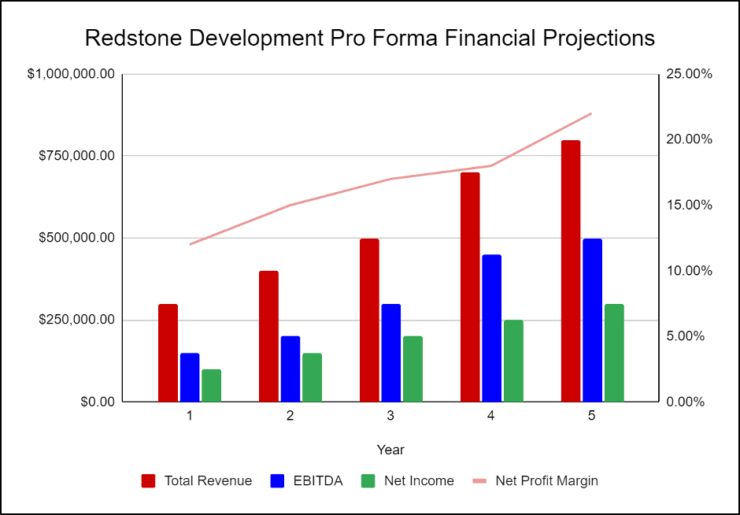
Company Overview
Who is redstone development.
Redstone Development is a new property development company located in Salt Lake City, Utah. We focus on residential property development for single-family and multi-family homes. We handle all steps of the property development process, from sourcing the land to selling the finished property. Redstone Development aims to be the most trusted source of affordable housing in the Salt Lake City metro area.
Redstone Development is owned and operated by Jack Grant, who is a real estate development industry veteran and well-versed in the entire property development process. Jack has over 30 years of experience developing residential properties and holds a Master’s in Real Estate Development. His education, experience, and industry connections will ensure that Redstone Development becomes one of the area’s most successful property development businesses.
Redstone Development’s History
After 30 years of working in the property development industry, Jack Grant began researching what it would take to create his own property development company. This included a thorough analysis of the costs, market, demographics, and competition. Jack has compiled enough information to develop his business plan and approach investors.
Once his market analysis was complete, Jack began surveying the local office spaces available and located an ideal location for the property development headquarters. Jack incorporated Redstone Development as a Limited Liability Corporation on October 1st, 2022.
Once the lease is finalized on the office space, renovations can be completed to make the office a welcoming environment to meet with clients.
Since incorporation, Redstone Development has achieved the following milestones:
- Located available office space for rent that is ideal for meeting with clients
- Identified the first property to develop
- Developed the company’s name, logo, and website
- Hired an interior designer for the decor and furniture layout
- Determined equipment and fixture requirements
- Began recruiting key employees
Redstone Development’s Services
Redstone Development will handle the entire property development process, including sourcing land, securing all necessary approvals and permits, construction, and sale of the finished property.
Industry Analysis
The real estate and property development industries have been strong over the past few years. As of 2021, the real estate industry was valued at $3.69 trillion and is expected to grow at a compound annual growth rate of 5.2% from now until 2030.
This growth will be driven by increasing demand for personal housing. Millennials and Gen-Z are beginning to rent their first apartments or buy their first homes. After years of living with family or roommates, they are ready to have a space to call their own. This trend is leading to a substantial demand for housing that many cities are struggling to supply.
The main challenge to the property development industry is the decrease in market size in the land development industry. Over the past five years, the industry saw an average annual decline of 0.7%. However, we believe that the pandemic was a considerable factor in this decline. Currently, the land development market is valued at $12 billion USD, and we expect it to grow substantially due to the growth of similar industries and the increasing demand for housing, as mentioned above.

Customer Analysis
Demographic profile of target market.
Redstone Development will serve home buyers and real estate investors in Salt Lake City, Utah, and its surrounding areas.
The community of Salt Lake City has thousands of first-time home buyers, residential real estate investment firms, and people looking for affordable housing options in the area. The company will also target millennials specifically since the majority of first-time home buyers are in this age group.
The precise demographics for Salt Lake City, Utah are:
Customer Segmentation
Redstone Development will primarily target the following customer profiles:
- Home buyers
- Real estate investors
- Millennials
- Apartment/Condominium management companies
Competitive Analysis
Direct and indirect competitors.
Redstone Development will face competition from other companies with similar business profiles. A description of each competitor company is below.
Upscale Property Developers, Inc.
Upscale Property Developers, Inc. is a property development company in Salt Lake City. In business for over 40 years, Upscale Property Developers, Inc. provides oversight for the entire property development process for new single-family and multi-family residences, commercial offices, and government buildings across the area. Upscale Property Developers, Inc also offers a variety of property renovation, demolition, and revitalization services for existing buildings.
Although Upscale Property Developers, Inc. provides homes with a luxury aesthetic, they are also the most expensive property developments on the market, thus resulting in many first-time home buyers being priced out of the market.
Premium Property Development Solutions
Established in 1990, Premium Property Development Solutions is a property developer of new commercial and residential properties in Salt Lake City. The company specializes in eco-friendly building materials and upscale design options for individual and corporate clients. Clients can customize their building design or choose from a variety of standard design options. The company employs experienced property developers and designers who are well-versed in green building design.
Premium Property Development Solutions is more affordable than Upscale Property Developers Inc. but is still out of most first-time home buyers’ price ranges.
Salt Lake Residential
Salt Lake Residential is also a local property development company that manages the complete property development process from sourcing and permitting to construction and sale. They are mostly known for their unique apartment complex designs but are equipped to take on a variety of different builds. The company has been in business for about ten years and has developed a reputation for building quality homes for affordable prices.
Although Salt Lake Residential has a similar value proposition of luxury homes at affordable prices, this company lacks the green building and eco-efficiency component to their business model, thus losing out on business from eco-conscious home buyers.
Competitive Advantage
Redstone Development enjoys several advantages over its competitors. Those advantages include:
- Location: Redstone Development’s office is near the center of town, in the city’s shopping district. It is visible from the street, where many residents shop for both day-to-day and luxury items.
Marketing Plan
Brand & value proposition.
Redstone Development will offer the following unique value proposition to its clientele:
- Service built on long-term relationships and personal attention
- Big-firm expertise in a small-firm environment
- Client-focused property development, where the company’s interests are aligned with the client
- Effective project management
- Affordable pricing
Promotions Strategy
The promotions strategy for Redstone Development is as follows:
Website/SEO
Redstone Development will invest heavily in developing a professional website that displays all of the features and benefits of the property development company. It will also invest heavily in SEO so the brand’s website will appear at the top of search engine results.
Social Media
Redstone Development will invest heavily in a social media advertising campaign. The marketing manager will create the company’s social media accounts and invest in ads on all social media platforms. It will use targeted marketing to appeal to the target demographics.
Print Advertising
The company will invest in professionally designed advertisements to be printed in real estate publications. Redstone Development will also list its properties for sale in key local publications, including newspapers, area magazines, and its own newsletter.
Community Events/Organizations
The company will promote itself by distributing marketing materials and participating in local community events, such as local festivals, business networking, or sporting events.
Redstone Development’s pricing will be moderate so consumers feel they receive great value when purchasing properties from the company.
Operations Plan
The following will be the operations plan for Redstone Development.
Operation Functions:
- Jack Grant will be the Owner and President of the company. He will oversee all staff and manage client relations. He will also oversee all major aspects of the development projects. Jack has spent the past year recruiting the following staff:
- Sheila Johnson – Office Manager who will manage the office administration, client files, and accounts payable.
- Kenneth Bohannon – Staff Accountant will provide all client accounting, tax payments, and monthly financial reporting.
- Beth Martinez – Marketing Manager who will provide all marketing for Redstone Development and each property it manages.
- Jack will also hire a team of architects, engineers, interior designers, and contractors to design and build the properties.
Milestones:
The following are a series of steps that lead to our vision of long-term success. Redstone Development expects to achieve the following milestones in the following six months:
1/1/202X Finalize lease agreement
2/1/202X Design and build out Redstone Development
3/1/202X Hire and train initial staff
4/1/202X Purchase first property for development
5/1/202X Kickoff of promotional campaign
6/1/202X Find second property for development
Jack has over 30 years of experience developing residential properties and worked for several of our competitors. He also holds a Master’s in Real Estate Development from the University of Utah. His education, experience, and industry connections will ensure that Redstone Development becomes one of the area’s most successful property development businesses.
Jack will also employ several other full-time and part-time staff to assist with all aspects of running a real estate development business as outlined in the Operations Plan.
Financial Plan
Key revenue & costs.
Redstone Development’s revenues will come primarily from the sale of completed properties. The company will sell new single-family homes, multi-family townhomes, and apartment complexes/condominium properties to individual buyers and investors.
The cost drivers will be the overhead costs required to staff a property development office. The expenses will be the payroll cost, rent, utilities, office supplies, and marketing materials.
Funding Requirements and Use of Funds
Key assumptions.
The following outlines the key assumptions required to achieve the revenue and cost numbers in the financials and to pay off the startup business loan.
- Average monthly payroll expenses: $50,000
- Office lease per year: $100,000
Financial Projections
Income statement, balance sheet, cash flow statement, property development business plan faqs, what is a property development business plan.
A property development business plan is a plan to start and/or grow your property development business. Among other things, it outlines your business concept, identifies your target customers, presents your marketing plan and details your financial projections.
You can easily complete your Property Development business plan using our Property Development Business Plan Template here .
What are the Main Types of Property Development Businesses?
There are a number of different kinds of property development businesses , some examples include: Single-family detached housing, Multifamily housing, Developing and Subdividing Lots, and Commercial buildings.
How Do You Get Funding for Your Real Estate Development Business Plan?
Property Development businesses are often funded through small business loans. Personal savings, credit card financing and angel investors are also popular forms of funding. This is true for a real estate developer business plan and a real estate investment business plan template.
What are the Steps To Start a Property Development Business?
Starting a property development business can be an exciting endeavor. Having a clear roadmap of the steps to start a business will help you stay focused on your goals and get started faster.
1. Write A Property Development Business Plan - The first step in starting a business is to create a detailed real estate development company business plan that outlines all aspects of the venture. This should include market research on the real estate market and potential target market size, information the services you will offer, marketing strategies, pricing details and a solid financial plan.
2. Choose Your Legal Structure - It's important to select an appropriate legal entity for your property development business. This could be a limited liability company (LLC), corporation, partnership, or sole proprietorship. Each type has its own benefits and drawbacks so it’s important to do research and choose wisely so that your property development business is in compliance with local laws.
3. Register Your Property Development Business - Once you have chosen a legal structure, the next step is to register your property development business with the government or state where you’re operating from. This includes obtaining licenses and permits as required by federal, state, and local laws.
4. Identify Financing Options - It’s likely that you’ll need some capital to start your property development business, so take some time to identify what financing options are available such as bank loans, investor funding, grants, or crowdfunding platforms.
5. Choose a Location - Whether you plan on operating out of a physical location or not, you should always have an idea of where you’ll be based should it become necessary in the future as well as what kind of space would be suitable for your operations.
6. Hire Employees - There are several ways to find qualified employees including job boards like LinkedIn or Indeed as well as hiring agencies if needed – depending on what type of employees you need it might also be more effective to reach out directly through networking events.
7. Acquire Necessary Property Development Equipment & Supplies - In order to start your property development business, you'll need to purchase all of the necessary equipment and supplies to run a successful operation.
8. Market & Promote Your Business - Once you have all the necessary pieces in place, it’s time to start promoting and marketing your property development business. This includes creating a website, utilizing social media platforms like Facebook or Twitter, and having an effective Search Engine Optimization (SEO) strategy. You should also consider traditional marketing techniques such as radio or print advertising.
- 0121 228 2223
- Training Login

- Property Mastermind Accelerator (3-day)
- Property Mastermind Programme (12-months)
- Property Mastermind Coaching (12-months)
- Book a pin Meeting
- Become a pin Member
- Become a pin Speaker
- Become a pin Preferred Partner
- Become a pin Helper
- Become a pin Affiliate
- Property Magic Book
- Strategy Profile Test

Deal Sourcing for Beginners
This blog is all about deal sourcing for beginners. So what is deal sourcing? Well very simply, it's about finding great property deals, either for yourself, or to sell onto another investor for a fee. I am going share exactly what makes a great deal in this deal sourcing beginners guide.
One of the most important things you need to learn to be a successful investor, is how to find good property deals. So first of all, you need to know what makes a good property deal. Here are some criteria I want you to think about when looking for property deals.
Equity On Day One
It is great if you can get equity in the property on day one, the day you buy it, instead of just having to wait for the market to go up in value. This is done by purchasing from motivated sellers.
Let’s say you find a property that is worth £200k, but if you buy if from a motivated seller who needs speed and certainty, you could save tens of thousands of pounds off the purchase price. So, if we buy at a discount, you could buy a £200k property for say £170k, which means the day we buy, we get £30,000 of instant equity.
Just to be clear here I am not saying that you should always buy at a discount. Sometimes we will pay for full market price, I'll explain why we might do that later on. But buying with equity on day one is always a good thing.
Buy In An Area of Strong Rental Demand
The next thing is, we want to make sure we buy a property in an area of strong rental demand. We want to be able to quickly and easily rent it out to new tenants if the current tenants move on.
"We only ever buy properties that have positive cash flow, if there is no cash flow then it is not a good deal."
Buy Property With Strong Cash Flow
Linking to strong rental demand, we want to make sure we get cash flow from any property that we buy. What that means is, when we take the rental income each month and we pay all of the costs including; the mortgage, insurance, management fees, anything else, there must be some profit leftover. That's what we call positive cash flow. We only ever buy properties that have positive cash flow, if there is no cash flow then it is not a good deal.
Buying A Property Where You Can Add Value
The next thing in terms of how to do deal sourcing, it's great if we can buy a property where we can add value. If you buy a brand-new property, you can't really add any value to that. If we buy an older property, then we can do things to increase the value. Maybe we can renovate it, we can put a new kitchen in, new bathroom, new carpets, and we can paint it. After this, what was a tired house suddenly becomes a desirable property again. Maybe we can extend it. Do a side extension, convert the garage into a room. Maybe we can extend the back, go into the attic. In some areas like in London it can be worth digging down into the basement, because space is at a real premium.
So what can we do to add value to the property? Sometimes, we might actually buy a property at full market price. Maybe it's worth £200k and by spending £30k on it, the total cost to you would be£230k in total. But the value might be as high as£300k. So if we can add value to a property, there's maybe a good reason why you might be happy to buy at the full market price.
"Return on Investment is a comparison of how much does it generate for us every single year, compared to how much we have to put in to get that cash generating asset."
Minimise How Much You Put In & Maximise The Return On Investment
The next thing you want to do is where possible, minimise the amount of money you have to put into the deal. That's always good, because that means you can buy more deals.
Return on Investment is a comparison of how much it generates for us every single year, compared to how much we have to put in to get that cash generating asset. It's a percentage. So we take the annual profit, divide by the initial investment, multiply that by 100 to give us a percentage. The higher the percentage, the better the deal is for us.I have written another blog on 'How to Calculate Return On Investment ' if you want to find out more.
Does Your Deal Meet The Criteria?
When you are looking for great deals, you need to look for as many of the criteria as you possibly can. You probably won’t get all of these criteria in one deal, but if you don’t find one which meets all of these criteria, you need to move really quickly. Because if it's a great deal, and if you don't buy it quickly, someone else who's quicker will come in and snap it up. By educating yourself, learning what makes a great deal and moving quickly when you know you've got a great deal, then you're going to be a more successful investor.
You should to pick an area sometimes called a 'gold mine area' you want to focus on. Typically, it should be close to where you live or where you work, because you're going have a better understanding of which are the good areas, which are the not-so-good areas. But, if you have a local power team of professionals who can help you, then maybe you can infest further afield.
"By educating yourself, learning what makes a great deal and moving quickly when you know you've got a great deal, then you're going to be a more successful investor."
Most people starting to invest, should firstly look where they live or work. If the deals don’t stack up where you live, try looking in an area up to 45 minutes from where you live. Somewhere within that radius there's going to be an area where deals stack up better.That's the area to focus on.
I hope this blog on how to deal source properties has been useful. Please feel free to share it if you think it has helped you.
FREE Deal Sourcing Training Available
If you would like to learn more about Deal Sourcing, Simon Zutshi has put together a FREE On Demand Master Class - all about successful Deal Sourcing investing.
To register & find out MORE about how you can access this valuable Deal Sourcing training at NO COST - click here.

Professional Property Investor | 18 Years Experience
Founder and CEO of property investors network Author of Amazon’s No.1 Best Seller “Property Magic” Host of Property Magic Podcast Available on iTunes
Visit My Website: https://simonzutshi.com/
Share this Post
Invest with Knowledge, Invest with Skill.
- Become pin Preferred Partner
- FREE Property Magic Book
- FREE Strategy Profile Test
- FREE Hidden Assets Test

- Privacy Overview
- Strictly Necessary Cookies
- 3rd Party Cookies
- Additional Cookies
- Cookie Policy
This website uses cookies so that we can provide you with the best user experience possible. Cookie information is stored in your browser and performs functions such as recognising you when you return to our website and helping our team to understand which sections of the website you find most interesting and useful.
Strictly Necessary Cookie should be enabled at all times so that we can save your preferences for cookie settings.
If you disable this cookie, we will not be able to save your preferences. This means that every time you visit this website you will need to enable or disable cookies again.
This website uses Google Analytics to collect anonymous information such as the number of visitors to the site, and the most popular pages.
Keeping this cookie enabled helps us to improve our website.
Please enable Strictly Necessary Cookies first so that we can save your preferences!
This website uses the following additional cookies:
Analytical or performance cookies
Functionality cookies
Targeting cookies
Our website uses cookies to distinguish you from other users of our website. This helps us to provide you with a good experience when you browse our website and also allows us to improve our site.
A cookie is a small file of letters and numbers that we store on your browser or the hard drive of your computer if you agree. Cookies contain information that is transferred to your computer's hard drive.
We use the following cookies:
- Strictly necessary cookies. These are cookies that are required for the operation of our website. They include, for example, cookies that enable you to log into secure areas of our website, use a shopping cart or make use of e-billing services.
- Analytical or performance cookies. These allow us to recognise and count the number of visitors and to see how visitors move around our website when they are using it. This helps us to improve the way our website works, for example, by ensuring that users are finding what they are looking for easily.
- Functionality cookies. These are used to recognise you when you return to our website. This enables us to personalise our content for you, greet you by name and remember your preferences (for example, your choice of language or region).
- Targeting cookies. These cookies record your visit to our website, the pages you have visited and the links you have followed. We will use this information to make our website and the advertising displayed on it more relevant to your interests. We may also share this information with third parties for this purpose.
The purposes for which we use the above cookies include the following:
- Estimate our audience size and usage pattern.
- Store information about your preferences, and so allow us to customise our site and to provide you with offers that are targeted to your individual interests.
- Speed up your searches.
- Recognise you when you return to our site.
- Allow you to use our site in a way that makes your browsing experience more convenient, for example, by allowing you to store items in an electronic shopping basket between visits. If you register with us or complete our online forms, we will use cookies to remember your details during your current visit, and any future visits provided the cookie was not deleted in the interim.
We do not share the information collected by the cookies with any third parties.
You can choose which analytical, functionality and targeting cookies we can set.
However, if you use your browser settings to block all cookies (including essential cookies) you may not be able to access all or parts of our website.
About RWinvest
Why choose rwinvest.

The Gateway, Liverpool
£164,950, calculators, get in touch, join our mailing list, how to create a property business plan for your investment.
Don't miss out on the best new investment deals. Enter your details now to sign up to our mailing list and receive exclusive information straight to your inbox.
- A Step-by-Step Guide to Writing a Rental Property Business Plan
If you’re planning on buying rental property, you’re going to need a business plan.
While this, admittedly, sounds incredibly dull and complex, creating a business plan can often separate the best real estate investors from the rest.
Although it may be tempting to dive right in and start earning your (hopeful) millions right away, a rental property business plan can massively increase your chances of success and help you make the right decisions.
And the best part? It doesn’t have to be complicated. By reading this article, you can find out how to build the perfect rental property business plan in just six simple steps.
Topics on this page include:
- Buy to let business plan example
- How to write a rental property business plan
- How to pick the right area for an investment
We’ve also created a downloadable (and completely free) property business plan template. All you need to do is fill out your details in the sign-up form below for instant access!
Without further ado, let’s find out how to write a plan to start building a rental property business.
Only £30,000 Deposit Required
15% deposit secured for next 10 units only!

- What Is a Property Business Plan and What Does it Consist of?
Before you make any decisions, let’s quickly explain what a property investment business plan consists of, and why you should spend the time making one.
Simply put, a rental property business plan outlines what you hope to achieve with your venture.
It doesn’t have to be a 30-minute PowerPoint presentation or a 1,000-word essay. In fact, the most effective business plans are simple, concise, and easy to commit to memory.
To make an effective one, there are three central aspects to make an ideal rental business plan.
You’ll need to think about:
- Where you are now – this includes your available finances and how much money you’re willing to spend.
- Your goals – think about where you want to get to, which can include an accurate financial goal to help you achieve specific dreams.
- Your chosen strategy – by picking the right strategy that aligns with your goals, you’ll be able to bridge the gap between your current situation and your dream after real estate investing.
We’ll discuss each of these, plus two effective tips, in the following five sections.
Lock in our 15% Deposit Deal Today
Save around £40,000 on your deposit with our exclusive 15% deposit offer valid on the next 10 units only.

- Step 1: Assess Your Starting Point
Every journey has a start point, and knowing yours will help determine exactly what sort of rental property investment you’re aiming for.
To complete this step, there are a few questions you need to honestly ask yourself.
- How much money do you have to invest?
- How much time do you have available to manage your property?
- Do you have the needed skills and knowledge to be an effective landlord?
The first point is likely the most important: Can you afford this investment?
This includes assessing your available funds, thinking about how much you’re willing to spend, and working out how you will pay for your investment.
The reality is property can be expensive, surpassing over £285k in March 2023, which was £11,000 higher than in 2022.
In our blog post, how much money do you need to invest in property , we calculated that you’ll need about £30k as a minimum to buy a property worth £100k, which is on the lower end of the spectrum.
That’s not to mention the ongoing costs you’ll likely need to contend with, including potential ground rent, property management costs, maintenance costs, and mortgage payments.
Be sure to speak to a mortgage broker to determine what sort of finances you have available, and ensure you set some money aside (six months’ wages is recommended) in an emergency fund to help you enter your first property investment with a better sense of financial security.
With a clear view of your finances in order, you can start accurately assessing opportunities on the property market and start fleshing out your rental property business plan.
Completed, Furnished 2-Bed Apartment in Prime L1
We are now welcoming offers on this city centre property in a previously sold-out development. Get in touch and get your offer in.

- Step 2: Think About Your Goals
Once you know what you’re starting with as an investor in terms of budget and knowledge base, the next step of your property business plan should look at your goals.
Setting goals is an essential part of any property journey as it allows you to outline the reasons why you’re investing and paint a clear picture of what you hope to achieve.
It goes without saying that the main reason that a lot of people invest is to make money, but it’s important to look a little deeper than that for your investment property business plan.
When creating a property business plan, the most common investment goals are as follows:
- Saving an attractive retirement fund.
- Saving money for life events.
- Increasing disposable income and passive income for financial freedom.
But while having these goals in mind is important, the best way to develop your rental property business plan is to put actual numbers behind each goal.
Instead of saying, “I want to have more money each month to fund my lifestyle” you should assess deeper and put a number behind this – let’s say £5k a month.
By doing this, you can accurately assess your local housing market and start building your property portfolio to see what real estate will effectively contribute to this figure.
You also should think about when you want to achieve your goals, which can have a huge impact on the type of property you choose.
Let’s go over two example properties.
- A purpose-built student apartment in the city centre that is generating 10% annual returns through rental income but won’t grow too much in value.
- A family home on the outskirts of a city that generates a 5% NET positive cash flow and has huge potential for further capital growth.
In these scenarios, someone hoping to increase their monthly rental income over the next three years would be more suited to the first.
However, those real estate investing for retirement funds would likely want to take the risk and wait for a long period to enjoy a huge cash payout on the family home.
Aside from the money you will have generated, think about your personal goals.
Do you want to be a skilled property professional who manages their rentals with a hands-on strategy and takes on landlord duties on a number of properties? Or do you want to own a portfolio of properties with a hands-off strategy, working with a rental/letting management company that takes care of all of the day-to-day duties?
If you have another career that you think will dominate a lot of your time and attention in the foreseeable future, your personal goals may be more fitted to an investment property business plan that allows you to juggle both your career and your investments.
£152k Required on Luxury 3-Bed Penthouse
14th floor 3-bed apartment with HUGE assured NET rental income and spa access.

- Step 3: Create Your Strategy
Step three of your property venture journey is likely going to be your most important and is often the main factor that separates the most successful investors from the biggest failures.
For most people’s goals, one property simply won’t be enough, with the average UK rental income valued at £1,199 per calendar month according to the HomeLet rental index.
This is why it’s a smart idea to come up with a strategy to fulfil your long-term ambitions to flesh out your property portfolio.
You can do this in several ways.
- You can save up your rent and reinvest the profit into a new real estate venture.
- You can buy properties with lower property prices, at auction or off-plan, to increase your purchasing power.
- You can flip houses, which means buying properties at a lower market value, adding value, and then quickly re-selling to boost your available cash.
By having a clear vision like this, you will avoid getting stuck in an investment that doesn’t further your goals and can instead focus your time and money on making a good investment.
Choosing a strategy can also involve specifically deciding what type of property you want to invest in.
When it comes to real estate and creating a buy-to-let business plan, there are several different strategies you can consider in your investment decisions – each being differently suited to your skillset and investment goals.
These can include:
- Residential buy-to-let – the most standard form of buy-to-let that involves buying a flat or house and renting to a tenant. This type of property usually offers the best blend of cash flow and capital growth potential.
- Purpose-built student accommodation – Another popular type of investment property that consists of buying a property and renting solely to student tenants. PBSA offers lower property prices and comparatively higher rent prices than traditional buy-to-let but has less capital growth potential.
- HMOs – a house of multiple occupancies is rented out to multiple tenants, increasing potential cash flow and ROI. However, HMOs can be complex, with a tonne of legislation in place that beginner investors may find intimidating.
- Commercial buy to let – involves the purchasing of an office block or retail space and renting to a company. Commercial properties have longer lease lengths than traditional buy-to-let, but it can be much harder for investors looking to secure financing from buy-to-let mortgages.
If you want to learn more about your options for choosing a rental property, be sure to check out our top 10 list of the best property investment strategies in 2024.
Along with the investment strategy itself, you should also think about your exit strategy.
An exit strategy outlines how and when you plan to exit your investment, which, with a property business plan, will mean selling the property.
Again, your investment goals will play a part in this decision. If you hope to generate as much money as possible for retirement, your exit strategy should look at selling the property sometime before you retire.
Spend some time researching exit strategies to better incorporate this into your buy-to-sell or buy-to-let business plan.
Foreign Investment in the UK 2023/24
Based overseas? This is the perfect guide for property investors looking to buy property in the UK.

Off-Plan vs Completed Property
The ultimate guide to help you choose whether to invest in off plan or completed property in 2024.

- Step 4: Action Your Buy to Let Business Plan With a To-Do List
Now that you’ve got a business model in place and have nailed the planning process, it’s time to action your business plan.
But where to start? While it might seem daunting for many investors to action their solid plan, the best tip possible is to break down your goals into small actionable individual tasks.
Although your overall goal may be to, say, earn £5,000 a month, you’ll need a series of achievable sub-goals in place before you can reach your golden number.
These sub-goals could be anywhere from securing your first property within three months from now, finding tenants, or simply securing a mortgage broker.
By setting out these goals, you’ll have a much clearer financial plan and vision for your rental property business.
The best way to achieve these goals is to create a to-do list of every task you need to do, both one-off and recurring tasks. You should break some of these tasks into even smaller tasks so you constantly feel like you’re making progress.
For instance, let’s say you decide that you want to buy a city centre apartment for your first investment.
You should first allocate the amount of time you want to do this each day and break down your time into individual websites.
As an example, your tasks could be:
- Search Rightmove for 20 minutes
- Search Zoopla for 20 minutes
- Search RWinvest for 20 minutes
- Bookmark/favourite any properties that catch your eye.
- Contact the estate agents/ sales agents to learn more about the properties.
With this, you’ve got a clear pathway, know exactly what you’re going to do, and can tick off each task as it’s completed. Soon enough, you will find the perfect rental property for you, and it will be well underway to create the dream property business.
It’s also important to address that not every task needs to be completed by you. In fact, while you could certainly achieve every aspect of property investment as an individual, if you don’t have the skillset, it would be a mistake not to outsource or reach out to others for help.
For example, if you have a full-time job or don’t have the necessary skills to fulfil your landlord responsibilities, you could hire a property manager. By doing this, a property manager will handle all day-to-day duties and can find tenants on your behalf.
RWinvest Investment Finder
What's your investment objective.
Minimum investment of £40,000
What's your estimated budget?
What areas are you interested in, what size property interests you, your exclusive brochure is ready.

- Step 5: Choose the Right Location for Your Target Tenant
The next step in creating an ideal real estate investment group business plan is to decide on what location you’re investing in.
While many landlords fall into the trap of buying a property that’s close to where they live, this could be a mistake, with the UK rental market notorious for having huge regional variations.
These regional variations can impact every aspect of a property venture, with variations in the rent price you can charge, the purchase price of the property, rental demand, and capital growth.
You’ll want to target the best area possible and consider rental properties with the highest chance of attracting your target tenants.
For starters, let’s discuss how to evaluate if an area is worth an investment. You can do this in a few ways.
- Research the average property price in the area – You can do this using sites like Zoopla, Rightmove, or the UK House Price Index.
- Research the average rent in an area – This will be a good indicator of how much you can expect to charge, and you can find this on sites like Zoopla and the HomeLet rental index.
- Look at past house price growth as an indicator of future growth potential – You can find this on the UK House Price Index, which shows average house prices every month, all the way back to 1968.
- Think of tenant demand – This is a harder measure to find, but a good indicator is looking at how many rental properties there are in an area and the population, with lots of young people a good indicator of a strong rental market.
- Familiarise yourself with future capital growth potential – You can achieve this by looking at the latest market predictions from experts like Savills or JLL.
Based on these criteria, the current best locations for rental property include Liverpool, Manchester, Birmingham, Leeds, and Luton. You can learn more by checking out our top 10 list of the best places to invest in property.
If you live away from any of these areas but still want the benefits involved with starting a rental business there, you can always hire a property management company to fulfil all your landlord responsibilities.
Here at RWinvest, we have helped a huge amount of foreign investors who are looking to invest in areas like Liverpool and Manchester.
Remember, though, that you should avoid buying too many similar properties in one area, no matter how attractive it seems. This is because if a local property market tanks, you don’t want all your eggs in one basket.
To avoid this, it’s a smart idea to diversify your portfolio. You can do this by buying a mixture of student properties and residential properties, and buying them in different areas like Liverpool or Manchester.
Thinking of Your Tenant
While picking the right location is an important step in your rental property business plan, it’s not enough to guarantee a successful investment. For this, you’ll need to think about what your tenant wants from their home and pick a property that aligns with these wishes.
This is true whether you’re buying single-family homes or a city centre apartment targeting young professionals.
Covid-19 and the resulting lockdowns have changed a lot of tenant priorities, with research from Benham and Reeves finding that high-speed WiFi, outside space, and proximity to outside green space is now the top three demands from tenants.
This is significantly different to previous rankings, which saw nearby transport links, fast broadband, and onsite security as the top three.
While it’s a good idea to have a property that offers all tenant priorities, it’s essential you provide the top three desires to maximise your success potential.

The Mercantile
£199,950.
Embankment Exchange
£224,950.

Merchant’s Wharf, Manchester
£149,950.

One Baltic Square, Liverpool
£194,950.

The Mill, Liverpool
£154,950.
The Prestige, Liverpool
£144,950.

The Hive, Luton
£239,950.
Central Park, Liverpool

Vantage Point, Wigan
£142,950.
Browse all properties
Take a look at our latest property investment deals in top UK locations.

- Step 6: Consider Forming a Limited Company
The final step in your rental business plan is to decide if you’re going to form a limited company.
Forming a buy-to-let company has become incredibly popular over the last few years, with 2021 and 2022 breaking the record for the number of new companies set up by buy-to-let landlords.
This is for a good reason, too, with limited companies allowing some investors to save thousands on taxes by paying corporation tax instead of income tax and having access to more mortgage interest relief.
However, there are several downsides to starting a limited company, which include being taxed for taking money out of the company, no capital gains tax allowance, and difficulties securing a buy-to-let mortgage.
While forming limited companies isn’t usually beneficial for those only owning a single property, investors looking to build a property empire could see far higher profits from forming one.
You can learn more about this by reading our full guide on buying property through a limited company.
Save £5,000 On Your Next Purchase
Sign Up to our newsletter and receive a Discount Code for our latest property launch.

- Conclusion
We hope you’ve enjoyed this article about how to write a rental property business plan.
In summary, an effective plan is simple, has a clear intent, and is broken down into smaller tasks.
You can create a property business plan in just six steps.
- Assess your starting point
- Think about your goals
- Create your strategy
- Action your buy to let business plan with a to-do list
- Choose the right location for your target tenant
- Consider forming a limited company
Get Your FREE Liverpool Investment Guide
Everything you need to know about investing in Liverpool, one of the UK’s hottest investment cities.
- Take the Next Steps With RWinvest in 2024
Once you’ve created a detailed and considered property business plan, you should think about getting started with your investment and putting your business plan for buy to let into action.
The first step in actioning your investment is normally to find a property to invest in, and it’s important to focus on finding an opportunity that’s likely to bring you the highest returns possible.
That’s where RWinvest can help.
Here at RWinvest, we have a range of great investment properties in lucrative UK property investment hotspots, Liverpool and Manchester.
Offering assured yields of up to 7% and prices starting at £154,950, browsing our range of investment opportunities is a great way to put your business plan for buy to let into action.
Get in touch today for a free chat with one of our property consultants and get started with your property investment journey.
For more informative content and guides, take a look at the following suggestions:
- The Best Way to Invest £100k
- The Best Places to Retire in the UK
- Top Tips for Getting Started in Property Investment

Reece Pape is a property writer at RWinvest. Reece is passionate about keeping property investors updated on must-have information and housing market news, utilising the latest property market statistics and data.
Want to Get in Touch?
Fill in the form to contact us today and a member of our award-winning property team will be in touch to help.

I can honestly say they have put my mind at rest from day one answering all my questions I had , true professionals, I am not experienced in buying off plan or for a rental income but I have to say the process has been smooth from sales to Chloe in client care and now I’m handed over to the final stage for the site visits I feel very relaxed and happy with how amazing the team have been. I I can’t wait now to see the end built ! Thanks 🙏
Kelly Webber

I have had the pleasure of experiencing exceptional customer service from RWinvest. Adam and Michelle were remarkable and were exceedingly supportive in facilitating the acquisition of two properties in Liverpool, at "The Gateway." Their guidance was instrumental in the purchase of the properties and I express my utmost satisfaction with their assistance, and I am inclined to not only endorse but also consider any property advertised by RWinvest.
Narendra Rai

I am very happy and satisfied with RWinvest. Their team was always responsive, supportive and friendly throughout my investment process. Thomas from RWinvest team was especially very supportive and he made sure that I have all the necessary information at the right time. He helped me with all my queries, and helped me to complete my investment process smoothly and with peace of mind.

Table of Contents
Want £5,000 off this may.
Sign up to our newsletter below and get £5,000 off any property investment made before June.
Thank You! Here’s Your Code:
*Code valid on The Gateway project only. Code only valid for one purchase.
Sign up to our newsletter and receive a discount code for our latest property launch.
Get Your FREE Guide Today
Fill in your details to download a copy of our expert guide for access to essential tips and information.
Want to see the Location and Development?
Enter your details below to arrange a viewing tour of this property development. Act fast to secure the best available units at the best price!
Request More Information!
Don’t miss out on this fantastic UK property investment deal. Fill in your details to receive Floor Plans, Prices, and the Best Available Units straight to your inbox.
Want More Information?
Receive more information about this exciting investment opportunity by enquiring today. Don’t miss out on the best available units!
Get in Touch Today
Want to contact RWinvest? Enquire via the form below and a helpful member of our team will be in touch.
Limited-Time Only Deal!
The countdown is on for this unmissable buy to let deal. Enquire now to receive exclusive details before this offer expires.
Sign up to our mailing list today for information on the latest buy to let deals, new property launches, expert insights, and more.
Want to take a Virtual Tour?
Enter your details now to request a virtual tour of this property development. Act fast to secure the best available units at the best price!
Request Your Info Pack
Enter your details to receive a free copy of the Info Pack for this development, and learn more about this investment opportunity.
Request Floor Plans
Enter your details to gain access to floor plans for this development to help you select the best available units.
You are only steps away from your perfect investment!
Fill in your contact details below to learn more about this property investment.
- [email protected]
- +44 121 721 8653

The Importance of a BRRRR Business Plan: Why You Need One for Successful Property Investment
- May 20, 2023
- Pluxa Property
Table of Contents
The UK’s house prices increased 12.6% over the year to October 2022, as compared to September’s 9.9%. And these numbers are expected to rise in 2023.
For many, this presents an opportunity for significant returns through real estate investment.
But to navigate this ever-evolving market successfully, a sound strategy is paramount.
This is where the BRRRR business plan comes into play.
So, what are the benefits of choosing a BRRRR business plan and buying a property?
Let’s find out.
Key takeaway:
- Understanding the BRRRR business plan for successful real estate investment, providing a clear strategy for buying, rehabilitating, renting, refinancing, and repeating the process, leading to maximized returns.
- Also, know the importance of a professional property company that can help you with the BRRRR business plan.

Importance of BRRRR Business Plan
The BRRRR strategy, standing for Buy, Rehab, Rent, Refinance, Repeat, is an effective approach for real estate investment. A detailed BRRRR business plan is essential for the success of this strategy for several reasons.
1. Guiding Tool
The real estate market is complex and multifaceted. With numerous factors, navigating without a clear plan can be challenging. A BRRRR business plan is a roadmap providing step-by-step guidance through investment.
From identifying undervalued properties to budgeting for renovation costs, arranging to finance, and seeking tenants, the plan ensures you have a comprehensive strategy. This reduced the risk of costly errors and missed opportunities.
For example, suppose you’re targeting the London property market, known for its high property prices. In that case, your business plan can guide you to areas where prices are still affordable but have high growth potential. These can be areas earmarked for infrastructure development or undergoing regeneration, where property prices will likely increase.
2. Financial Planning
A BRRRR business plan is crucial for effective financial planning. It allows you to calculate potential rental income, estimate rehab costs, and forecast your return on investment. It ensures that you clearly understand your potential profits before purchasing.
For instance, if the average rent in Manchester for a two-bedroom apartment is £900 per month, and you purchase a property for £150,000 with £20,000 in rehab costs, your business plan will help you calculate the time it will take to recoup your investment and start generating a profit.

3. Market Analysis
The BRRRR business plan also assists in identifying and understanding market trends and forecasts. It is essential for making strategic investments that align with the market’s direction. It enables you to capitalize on growth opportunities and mitigate risks associated with market downturns.
Suppose the UK property market is forecasted to experience a slowdown in the coming year. In that case, your BRRRR business plan could help you identify investment opportunities in more stable markets or even plan to hold onto your properties until the market recovers.
4. Risk Management
Lastly, a BRRRR business plan is crucial for risk management. It allows you to identify potential challenges and pitfalls and plan for them. This could include potential increases in interest rates affecting your refinance terms or changes in rental laws impacting your landlord’s responsibilities.
For example, if there’s an upcoming change in UK rental law that affects landlord responsibilities, having a well-prepared BRRRR business plan will allow you to anticipate these changes and adjust your strategy accordingly, mitigating potential risks.
BRRRR business plan ensures that your decisions are informed, your finances are well planned, and that you’re equipped to navigate the complexities of the market, thereby maximising your chances of success in the UK’s competitive property market.
But with the BRRRR business plan, you can encounter unforeseen issues. So, look into the risk involved in BRRRR investment before you take a step with the investment strategy.
But to achieve these benefits, you must associate with experts who can assist you with professional property sourcing in the UK.
How Can Pluxa Property Help You?
As a real estate investor in the UK, having a trusted partner like Pluxa Property can prove to be an invaluable asset.
Our services are designed to assist and enhance every aspect of your BRRRR business plan, ensuring you are well-positioned for success in your real estate investments. Here’s how we can help:
- Property Sourcing : Our extensive knowledge of the UK property market allows us to source potential investment properties that align with your BRRRR strategy. We can identify undervalued properties in areas with high growth potential, helping you to purchase at a price that maximises your return on investment.
- Rehabilitation Management: We can manage the rehab process efficiently, coordinating with reliable contractors to ensure the work is completed to a high standard and within budget. We aim to increase the property’s value and make it more attractive to potential tenants, thereby maximising your rental income.

- Rental Assistance: Through our wide network and understanding of the local rental markets, we can assist in finding suitable tenants for your property. This helps to reduce vacancy periods and ensures a steady cash flow from your investment.
- Refinancing Guidance : Navigating the refinancing process can be complex. We provide advice on refinancing options and assist in securing the best terms, helping you to recover your investment faster and move on to the next property in your BRRRR strategy.
- Repeat Strategy: With our ongoing support, you can successfully repeat the BRRRR process with multiple properties. We can help identify new investment opportunities and provide continual advice and support as your property portfolio grows.
Choosing Pluxa Property isn’t merely about hiring a property service provider, it’s about forming a partnership with a team devoted to making your real estate investment aspirations a reality.
Drawing on our wealth of expertise and wide-ranging resources, we’re equipped to help you successfully implement your BRRRR business plan, optimising your returns on investment and setting you on a clear path toward fulfilling your financial objectives.
So, what’s making you wait?
Contact us now to learn more. You can also read reviews given by our previous clients.
How can I estimate the rental income potential of a buy-to-let property?
Estimating the rental income potential of a property requires a thorough understanding of the local rental market, including average rents for similar properties, occupancy rates, and projected rental growth. Tools like rental yield calculators can also be used to provide an estimation.
Leave a Reply Cancel reply
Your email address will not be published. Required fields are marked *
Save my name, email, and website in this browser for the next time I comment.
Related Posts

5 Tips to Optimize Your R2SA for Corporate Clients
Learn the best ways to optimize R2SA for corporate clients.

5 Major Ways in Which Location Affects Property Value
Know the major 5 impacts of location on property value.

A Complete Guide to Fix and Flip Strategy in Property Investment
Know the art to fix and flip in property investment.
UK’s Biggest Short Term Let Property Investment Company
ICO: ZA530584
PRS: PRS016641
Policy N:44404798
Useful Links
- Property Sourcing
- Our Portfolio
- Our Talk Show
- Privacy Policy
- Cookie Policy
- Terms & Conditions
Monday – Friday 09:00 AM – 06:00 PM
Get in Touch

Follow Us On

Get Started
Don’t have any account yet? Create a New Account
Our Quantum 7 Secret Formula for How to make £10k Cashflow per Month
Even if you have no experience or money!
- Privacy Overview
- 3rd Party Cookies
This website uses cookies so that we can provide you with the best user experience possible. Cookie information is stored in your browser and performs functions such as recognising you when you return to our website and helping our team to understand which sections of the website you find most interesting and useful.
This website uses Google Analytics & CRO tools to collect anonymous information such as the number of visitors to the site, and the most popular pages.
Keeping this cookie enabled helps us to improve our website.
Please enable Strictly Necessary Cookies first so that we can save your preferences!
Using partnerships and corporations to transfer farm assets
- Managing a farm
- Transfer and estate planning
- Utilizing partnerships and corporations to transfer farm assets
Quick facts
- Establishing a business entity, such as a partnership or corporation, can help with the process of transferring a farm business to the next generation.
- In Minnesota, there are two major categories of partnerships: partnerships and limited partnerships.
- The two corporation entities available to farm businesses are S corporation and C corporation.
Developing any business entity is a complicated process. Seek assistance from a qualified legal expert and accounting assistance if you plan to explore developing a business entity.
Transferring the farm business to the next generation can be a daunting task. However, there are strategies and methods that can help simplify the process.
When operating as a sole proprietorship, it can be challenging to establish a transition plan. There are many individual assets that need to be accounted for such as machinery, equipment, livestock and land. It is difficult and time consuming to transfer separate, individual assets.
One possible solution is to establish a business entity such as a partnership or a corporation to accomplish the business transition. As members and owners of the entity, the parents are issued ownership shares or shares of stock in the entity. These shares can be sold, gifted or passed through an estate to the entering generation, over time, as a method of transferring the business. This does away with the need to transfer separate, individual assets. This also spreads out the parent’s income and thus tax obligations. It allows the entering generation the ability to acquire assets over time thus minimizing their need for large amounts of capital.
In Minnesota, there are two major categories of partnerships: 1. partnerships and 2. limited partnerships. There are separate entities under each category which function differently.
1. Partnerships
There are two entities: general partnerships and limited liability partnerships.
General partnerships (GP)
Two or more people are required for the GP and are referred to as general partners. All partners are generally liable for all debts and obligations of the GP. There is no liability protection for their personal or partnership assets. Minnesota state law does not require a written partnership agreement. However, such an agreement outlining decision making and job responsibilities might be useful. If the name of the partnership is that of the partners (Henderson Family Partnership), the entity does not have to be registered with the State of Minnesota. The entity is taxed as a partnership, pass-through entity, with income allocated to each partner based on their ownership and included in their personal income tax.
Limited liability partnerships (LLP)
The LLP is similar to the GP with exceptions. All partners are general partners (no limited partners) but their liability exposure is limited to the assets they have placed into the LLP. Their personal assets are protected from liability exposure. The LLP is required to register with the Secretary of State in Minnesota. The LLP is taxed as a partnership, pass-through entity.
2. Limited partnerships
There are three partnership categories: limited partnership (LP), limited liability limited partnership (LLLP), and limited liability company (LLC).
Limited partnership (LP)
Two or more persons are required. There are both general and limited partners. General partners have no liability protection for their business assets but do for their personal assets. The limited partners’ assets in the LP as well as their personal assets have liability protection under the LP. The LP is required to register with the Secretary of State in Minnesota. and the Minnesota Department of Agriculture to comply with the Minnesota Corporate Farm Law. The LP is taxed as a partnership, pass-through entity.
Limited liability limited partnership (LLLP)
Two or more people are required. There are both general and limited partners and they have liability protection of both their LLLP assets and their personal assets. The State of Minnesota requires the LLLP be registered with the Secretary of State and the Minnesota Department of Agriculture to comply with the Minnesota Corporate Farm Law. The LLLP is taxed as a partnership, pass-through entity.
Limited liability company (LLC)
Requires only one person as a member of the entity. From a tax standpoint, the LLC can be taxed as a partnership pass-through entity or as an S Corporation. In addition, the LLC can afford tax savings via discounting assets and potential savings of self-employment taxes. The LLC provides liability protection much like that of a corporation.
The LLC has both members and managers. Members elect or appoint a board of directors. The State of Minnesota requires that the LLC register with the Secretary of State and the Minnesota Corporate Farm Law of Agriculture to comply with the Minnesota Corporate Farm Law.
The LLC can offer one additional level of liability protection by being registered in one of what are referred to as “protective states”. Although the list changes occasionally, some of the protective states include: Alaska, Arizona, Delaware, Nevada, New Jersey, South Dakota, Texas, Virginia and Wyoming. These states have written their LLC statutes to include an additional level of liability protection as long as the LLC members abide by all the statute rules. It is legal to register, for example, your Minnesota farm business in one of these protective states and still operate in Minnesota as you have been. You would need a contact in the state where registered. That contact would establish the entity on your behalf and at year end send you a K-1 form for income and you file your tax return just as you do now. This is a complicated process so seek expert legal help if you decide to develop an LLC in one of the protective states.
Registering with Minnesota Department of Agriculture
For the entities that are required to register with the Minnesota Department of Agriculture for compliance with the Minnesota Corporate Farm Law, this is an annual requirement and there is a $15 fee required to file the documentations. In addition, land held in trust must also register annually with the Minnesota Department of Agriculture for compliance with the Minnesota Corporate Farm Law.
As mentioned, partnerships pay no income taxes. All profit/loss, capital gains and credits are passed through to the partners on a prorated basis, depending upon the percent of ownership. However, the partnership must file a Form 1065 informational tax return, which is due each year by April 15.
Advantages and disadvantages
An advantage over sole proprietorship is that the owners have ownership units or shares. These units or shares can be sold, gifted or passed through an estate as a means of transferring the business over time to the entering generation.
One disadvantage with a partnership, except the LLC, is that the death of a shareholder or willful withdrawal by a partner can seriously disrupt partnership operations. The partnership agreement, if put into place at time of formation of the entity, should clearly describe buy-out provisions or state how the remaining partners are protected, no matter how circumstances change.
Partnership tax laws
Partnership tax laws are similar to individual tax laws. A partnership can generally take over the depreciation schedule of contributed machinery or buildings. A partnership can claim the Section 179 depreciation expense which is passed on pro rata to the partners. Each partner can claim depreciation, which includes his or her portion of the partnership allocation plus any other personal Section 179 depreciation.
Partnership members are self-employed individuals and must pay self-employment tax on their share of earned partnership profits. Partnerships do not receive the favorable tax treatment on fringe benefits (medical, accident and life insurance, housing and meals) as do “C” corporations. However, it generally costs less to form a partnership than a corporation and partnerships can be less formal to operate.
There are two corporation entities available to farm businesses. They are: S corporation and C corporation.
1. S corporation
The S corporation offers a higher level of asset liability protection than a sole proprietorship and some of the partnerships. It must be registered with the Secretary of State in Minnesota. The S corporation is taxed as a pass-through entity with profits allocated to the stock shareholders based upon their ownership percentage. The income then shows up on the shareholders personal income tax. There is no double taxation issue.
Business operating assets can be placed into the S corporation or they can be left out with only the corporate checkbook as part of the corporation operating entity. Placing assets into the corporation is a non-taxable event but getting them out is not. For that reason, it is a general rule of thumb not to place land into the corporation. See your attorney and accountant for advice specific to your situation.
2. C corporation
The C corporation also affords a higher level of asset protection than the sole proprietorship or some of the partnership entities. The C corporation offers longevity to the business because it is technically an entity onto itself with a life of its own. That is, people can enter and leave the C corporation and it continues on without interruption. It also affords many tax advantages regarding deductible expenses.
The C corporation however, can be subject to double taxation. The dividends paid to shareholders are taxed. If the corporation is not growing or acquiring new assets resulting in the corporation retaining earnings, those earnings can be taxed as well. Corporate tax rates are generally higher than other tax rates. Business operating assets can be placed into the C corporation or they can be left out with only the corporate checkbook as part of the corporation operating entity. Placing assets into the corporation is a non-taxable event but getting them out is not. For that reason, it is a general rule of thumb not to place land into the corporation. See your attorney and accountant for advice specific to your situation.
One additional point that applies to both S and C corporations. Shareholders have to maintain an employer-employee relationship with the corporation. If the shareholders maintain personal ownership of what they consider corporate assets, charge corporate business expense against those assets, are audited by the IRS, they may be denied those expense deductions because the assets were owned by the shareholders, not the corporation.
A corporation is established under state law. Each state permits corporations the right to do business. A corporation consists of owners who are called shareholders. The shareholders are the basic decision making group. They elect a board of directors to act for them on most operational decisions. Majority vote governs corporate decisions. Ownership of 51 percent or more of the stock gives you control. Minority shareholders have little if any decision making control unless permitted to do so by the majority shareholders.
Once a corporation is created, it functions much as a self-employed individual might. Corporations must establish their own name and bank accounts. The corporation can become an employer, a lessor or lessee, a buyer or seller, or engage in any other business activity.
Reasons why farms incorporate
- It is easy to transfer shares. Shareholders can gift, sell or pass through an estate, shares to others as they see fit. A majority shareholder can transfer up to 49 percent of the outstanding shares without losing control of the business.
- A corporation may simplify estate settlement in that it may be easier to value shares than individual farming assets.
- Self-employment (SE) tax can sometimes be reduced with a corporate structure. Instead of paying SE tax on all the Schedule F income as a self-employed individual would, the farmer becomes an employee of the corporation and social security taxes are paid only on wages they receive. See your accountant.
- A portion of meals and lodging furnished to employees of a C corporation are generally deductible to the corporation, but not taxable income to the employee. If lodging is provided on the farm and is a condition of employment, the home’s depreciation, heat, electricity and interest become deductible to the corporation. Remember the employer-employee relationship issue.
- Fringe benefits are deductible by C corporations. Health, accident and up to $50,000 of term life insurance is deductible to the corporation, but not taxable to employees.
- The corporation offers perpetual life, some economic efficiencies regarding capital acquisition, and provides income and social security tax flexibility. It can also provide continuation of a farm business through several generations.
Potential concerns related to the corporation
- Getting into a corporation is generally a tax-free event. Getting out is a taxable event. Don’t start a corporation unless you plan to continue it for many years.
- If the C corporation is profitable but is not growing and acquiring new assets, it can be troubled with retained earnings or excess profits. This can result in a tax obligation.
- Corporations have a different set of rules. Corporate meetings, extra record keeping, corporate income tax returns, reporting requirements, and quarterly tax estimates are part of corporate life. Complying with extra legal and regulatory requirements cost time and money each year.
- Minority shareholders have no power in directing the corporate business and can be easily “frozen out.” A majority shareholder (farming heir) can direct that no dividends be paid. Minority (non-farm heirs), may own shares that generate no income, and hence have no practical value.
- Corporate ownership of a house eliminates the use of the exclusion of gain or a sale of personal residence.
- Corporate ownership sometimes reduces independence and individual pride of ownership.
- It can be very difficult for a retired shareholder to receive any retirement income from an operating corporation. This is especially true if the retiree has no rental property, discontinues working for the corporation, and the corporation pays no dividends.
The farm corporation can be a valuable tool in tax planning and in the transfer process. However, it is a major commitment and a complex task to start a farm corporation. Before starting a corporation, make sure it fits your goals, objectives and business personality.
Self-employment tax on land, buildings and facility rent regarding entities
The US Eight Circuit Court of Appeals has ruled that if you are a member of any business entity (such as a partnership or corporation explained above); own land, buildings, or facilities that are outside that entity; and rent those items to the entity; the rental income is exempt for self-employment tax IF the rent is fair and reasonable.
This applies only to those states in the eighth circuit which include Arkansas, Iowa, Minnesota, Missouri, Nebraska, North Dakota and South Dakota. With any of these laws, they are subject to change so seek legal advice on this matter.
Discounting business entity assets
An additional strategy that may be useful is the discounting of assets being placed into a business entity, such as any of the partnerships or corporations described earlier.
When you place business assets such as machinery or livestock into the business entity, you can elect to discount those assets. The main reason for discounting assets being placed into the business entity is to reduce the size of an estate in order to get below the federal and perhaps even the state estate applicable exclusion amounts. Doing so will reduce or eliminate any estate tax.
Justification for the discount is based upon lack of marketability of the assets due to a fractional ownership interest.
One disadvantage of discounting is that you have artificially lowered the basis of the assets in the entity. This can be a problem if the entity is discontinued and the assets are sold as a result. This could result in a tax obligation. If the assets are replaced due to use, this is not an issue.
Assets being discounted and placed into an entity should be appraised. If, at a future date, the entity is audited by the IRS, you can document the value of the assets placed into the entity. For machinery and equipment, simply take the depreciation schedule to the local implement or equipment dealer and ask them to put a value on all machinery. Have them put the values in writing on their dealership letterhead along with a signature and date. For livestock you can take a list to a livestock auction facility or someone who deals in livestock and would have a grasp of the values. The values should be put in writing and listed on their letterhead with a signature and date. For land, seek the help of a realtor who deals with ag land. Simply have them do an estimate or appraisal of the land, put it in writing on their letterhead, with a signature and date.
Note: In late 2016, the Internal Revenue Service and the US Treasury Department enacted 2704 rules which drastically changed discounting rules and during which situations they may apply. If assets are transferred and then sold, discounting will definitely not apply. If you are contemplating discounting any assets seek legal and accounting assistance to make sure you are in compliance with 2704 rules.
Business entities and maintaining homestead classification
When using a business entity for ag land ownership, caution must be used in order to maintain eligibility for the Minnesota Qualified Small Business Property Qualified Farm Business Property estate exclusion. In addition, utilizing limited liability companies (LLCs) as a business entity have new rules to comply with due to passage of the Minnesota Revised Uniform Limited Liability Company Act of 2015. The law states the land-owning LLC and its members must be the ones farming the land on behalf of the owner LLC. If the owner LLC rents the land to someone else, even another member of the LLC who then farms it personally, homestead classification is lost and therefore the qualified farm property estate exclusion is also lost. New LLCs must have complied with the new law as of August 1, 2015. Existing LLCs must have complied with the new law by January 1, 2018.
Ag land held in any trust, except a revocable living trust, as well as land in limited partnerships, limited liability limited partnerships, S and C corporations and LLCs must file documentation with the Minnesota Department of Agriculture under the Minnesota Corporate Farm Law in order to be eligible for the qualified farm property exclusion. The application must be done annually and there is a filing fee of $15 per application.
For more details on the Minnesota Homestead Classification requirements see maintaining farm land homestead classification and qualification . This is a complex area and there is a lot at stake regarding the qualified farm property estate exclusion so seek legal advice specific to your situation when establishing any entity that owns ag land.
Farm Service Agency (FSA) payments and business entities
Under the current farm bill, there are some restrictions regarding commodity program payments made to individuals versus entities. Entities that limit member’s liability exposure (all entities except the general partnership) are limited to one maximum payment limit regarding FSA commodity program payments.
This is a complicated issue. If you have any questions or concerns related to your situation, check with your FSA office for details of the program.
Caution: This publication is offered as educational information. It does not offer legal advice. If you have questions on this information, contact an attorney.
Gary Hachfeld, former Extension educator; David Bau, Extension educator and C. Robert Holcomb, Extension educator
Reviewed in 2017
© 2024 Regents of the University of Minnesota. All rights reserved. The University of Minnesota is an equal opportunity educator and employer.
- Report Web Disability-Related Issue |
- Privacy Statement |
- Staff intranet

- Subscribe For Free

Mercury City Tower, an Award-Winning Mixed-Use Development in the Moscow City Business District
This stunning golden tower is 339 metres high with 75 floors – making it 29 metres taller than london’s skyscraper the shard. its diagonal lines echo the aggressive geometry introduced by vladimir tatlin, the founder of the constructivism movement in architecture which flourished in 1920’s moscow. apartments at mercury city tower are the embodiment of an entirely new lifestyle, completely altering perceptions of time and its density. here residents can quickly and easily pass from the hectic pace of the modern metropolis to an atmosphere of contemplation and serenity. corresponding to the highest possible standards, the apartments offer optimum security, breathtaking city views, supreme comfort and a wide range of services and amenities. the building also complies with the highest standards established for class a+ premium office space. the rentable office area occupies floors 4 to 39 and covers approximately 78,000m², combining pragmatism with aesthetics and beauty with functionality. the private club floor includes lounge zones, a bar and cigar rooms, all at the exclusive disposal of mercury city tower’s residents and their guests. a banquet hall named mercury space has also hosted private events for such companies as sap, visa and the state department of government of moscow..
Mercury City Tower +7 (495) 730 54 72 [email protected] www.mercury-city.com
Comments are closed.
International Property & Travel

© 2024 International Property Media.
- Skyscrapers
- Apartments for Sale
- Apartments for Rent
- Houses for Sale
- Houses for Rent
- Luxury Real Estate
- Mansions in Russia
- Palaces in Russia
Watch Video
- Residence permit in Russia

With us, your property deal in Russia will be secure!
Real Estate in Moscow
We are an international real estate company situated in Moscow City , and our mission is to help expats find and purchase real estate for sale in Russia. You can use our database to search for all kinds of real estate listings, including rental apartments with excellent views located at the very heart of the capital, penthouses in Moscow’s celebrated residential complexes, suburban mansions and gated community residences .
We provide a very wide choice of residential properties in those parts of the capital which are known for the greatest prestige; most notably, in the Patriarch’s Ponds area and the Arbat, Ostozhenka and Zamoskvorechye Districts. And if you are interested in palaces , mansions and cottages , we will find for you a selection of property for sale in the most high-status and historically prestigious communities and settlements of Moscow Oblast , particularly those concentrated around the Rublyovo-Uspenskoye and Novorizhskoye shosse. Just send us a request with your requirements!
Full Range of Services for Expats
You can come to us with whatever you need - we will even find a school for your children!

We offer advice on areas that are safe to live in and recommend the best banks for making international transactions. Our lawyers conduct thorough assessments of all relevant property documentation to safeguard you against seller fraud.

We provide visa assistance. We will help you with your migration registration and with obtaining a residence permit in Russia. We are always ready to resolve any problems you might have with obtaining a citizenship.

We provide help with resolving any issues related to the maintenance of your home. We will assist you in hiring domestic help and a nanny for your child. We will find a private British, American or French school for your children.
Properties for Sale in Russia
The listing shows examples of real estate prices
- Contact for price

Luxury house 8290 sqft in Vnukovskoye settlement
- Houses for Rent, Houses for Sale, Luxury Real Estate, Mansions In Russia

Moscow City apartment on the 50th floor
- Apartments for Rent, Apartments for Sale, Luxury Real Estate, Moscow City apartments

Deauville Castle 10 km from Moscow
- 13400 Sq Ft
- Houses for Rent, Houses for Sale, Luxury Real Estate, Palaces In Russia

Mansion 785 sqm in the most expensive place in the Moscow Oblast
- $8,400/Monthly

3-room apartment 187 sqm on the 33rd floor
- Apartments for Rent, Moscow City apartments
- $5,100/Monthly
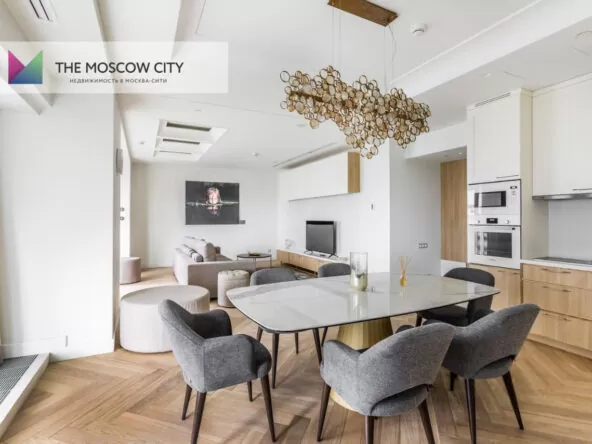
2-room apartment 102 sqm on the 45th floor

2-room apartment 60 sqm in Dokuchaev lane

5-room apartment 203 sqm on Minskaya street
- $1,700/Monthly
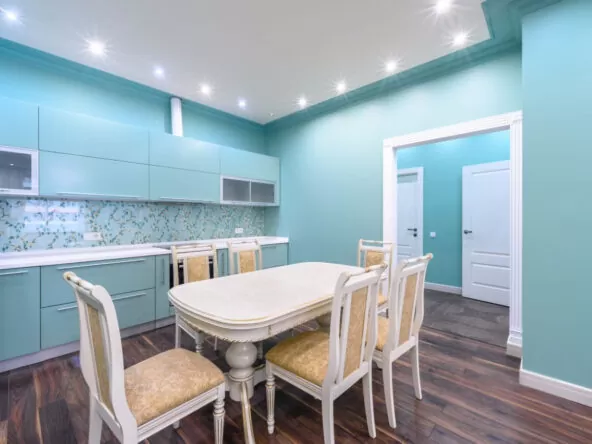
3-room apartment 110 sqm in the north of Moscow

3-room apartment with Hyatt service

5-room apartment on Leninsky prospect

3-storey country house 960 sqm on Rublevka
- 10333 Sq Ft
- Houses for Rent, Houses for Sale
- $6,700/Monthly

3-storey house 360 sqm with 4 bedrooms
- $15,000/Monthly

Country house 1234 sqm on Rublevskoe highway
- 13282 Sq Ft
- Houses for Rent, Luxury Real Estate

Apartment 193 sqm on the 52nd floor of Moscow City
- Moscow City apartments

Apartment on the 63rd floor in the OKO tower
- Apartments for Rent, Apartments for Sale, Moscow City apartments

House 380 sqm 12 km from Moscow

Penthouse 140 sqm on the 46th floor

Office 107 sqm on the 84th floor of a skyscraper in Moscow
- Commercial Property

4 room apartment 203 sqm in the house with a swimming pool
- Apartments for Sale, Luxury Real Estate
- $18,000,000

Modern house 2000 sqm on Rublevsky highway
- 21530 Sq Ft
- Houses for Sale, Luxury Real Estate, Mansions In Russia, Palaces In Russia

Apartment 193 sqm on the 52nd floor in Moscow City
- Apartments for Sale, Moscow City apartments

767 sqm premises for a restaurant in the city center

House 900 sqm 12 km from Moscow
- Houses for Sale, Luxury Real Estate, Mansions In Russia
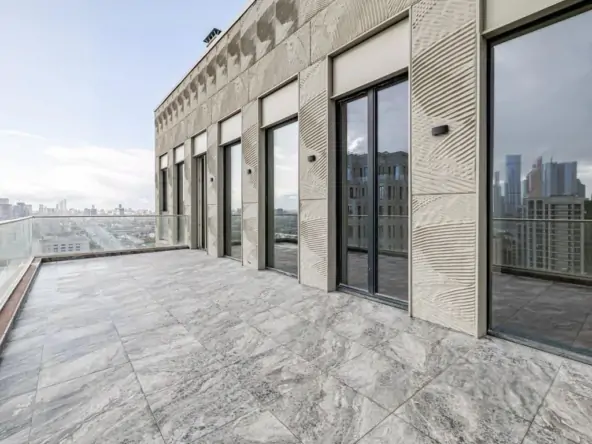
Apartment 76 sqm on the 34th floor in NEVA TOWER

House 750 sqm in the village of Gorki 2
- Houses for Sale, Mansions In Russia
- $85,000,000

Business center with a Mercedes showroom
- 177410 Sq Ft

Townhouse 530 sqm in the very center of Moscow
- Apartments for Sale, Houses for Sale, Luxury Real Estate

English-style mansion 8 km from Moscow
- 26900 Sq Ft

Compare listings
Reset Password
Please enter your username or email address. You will receive a link to create a new password via email.
Send a Request
Jenee Tibshraeny: NZ Herald Wellington business editor on the Government's plan to tax commercial property owners an extra $575 million
- Podcast Episode

Add a plot in your language
User reviews
- May 1, 2024 (United States)
- See more company credits at IMDbPro
Related news
Contribute to this page.
- IMDb Answers: Help fill gaps in our data
- Learn more about contributing
More to explore

Recently viewed
We've detected unusual activity from your computer network
To continue, please click the box below to let us know you're not a robot.
Why did this happen?
Please make sure your browser supports JavaScript and cookies and that you are not blocking them from loading. For more information you can review our Terms of Service and Cookie Policy .
For inquiries related to this message please contact our support team and provide the reference ID below.
Malaysia might add a casino to boost troubled $100 billion mega-development Forest City
- Malaysia may add a casino to Forest City, a mega-development that has turned into a ghost town.
- The casino, which would be the second in the country, could rejuvenate the struggling property.
- The move may attract Singapore tourists, who pay a daily tax to gamble at home.

Malaysia's Forest City mega-development started with big ambitions and big money.
Announced in 2006, the luxury housing project in the south — easily accessible from Singapore — would house 700,000 people and feature a waterpark and hotels. The whole project cost its developers $100 billion.
But, eight years after construction began, only a few thousand people live there. The project has turned into a ghost town — and a major liability for its developer, which is facing sizable financial issues elsewhere.
Now, Malaysia is in talks with several high-profile investors to add a casino to Forest City, people familiar with the matter told Bloomberg on Wednesday.
The southeast nation's Prime Minister Anwar Ibrahim met with the heads of a Malaysian property development firm and a resort company at Forest City last week. A representative of Malyasia's billionaire king, Ibrahim Iskandar, also attended, the people told Bloomberg.
King Ibrahim owns more than 20% of Forest City as part of a joint venture with Chinese real estate developer Country Garden, Bloomberg reported. The king took the throne in January for his five-year term and said last month he is ready to "begin my real way of ruling." The other partner, Country Garden, is facing significant financial issues from China's floundering property market and had nearly $200 billion in liabilities at the end of last June.
The two tycoons who met with the prime minister last week own some of Malaysia's most prominent businesses. One of the companies is Genting Group, a resort and theme park operator that owns Malaysia's only casino, located in a central Malaysian hill town. Genting operates other casinos in Singapore, the US, and the UK. The other, Berjaya Corp., runs hotels and develops properties, among other businesses.
Related stories
The casino talks are in early stages and it is unclear if Prime Minister Anwar will allow such a business. Malaysia has a Muslim-majority population and those following Islam are prohibited from gambling.
Forest City did not immediately respond to BI's request for comment.
Expensive, empty apartments
A casino — which would only be the second in Malaysia — could help struggling Forest City.
While advertised as a "popular short-haul tourist destination," the complex, which includes apartments, hotels, a waterpark, and a mall, only sees a few dozen visitors each day, Business Insider reported in April. Those who do come are typically on a budget and don't spend much.
As of last year, only about 15% of the planned property had been completed, local media reported.
Most apartments look like they've never been lived in, a BI reporter who visited earlier this year observed. They're almost twice the price of other apartments in the city, and wealthy people prefer to buy single-family homes, BI reported in April .
A new casino could attract tourists from Singapore. Singapore's government disincentivizes gambling by taxing residents 150 Singapore dollars , or $110, to enter local casinos. Singapore is connected by a one-kilometer bridge to the state of Johor, where Forest City is.
Cities around the world are similarly looking to add casinos to boost tourism.
The United Arab Emirates, another majority-Muslim country, is betting big on gambling. Earlier this year, it launched a federal-level gaming authority, and plans are in place to create an " Arabian Strip ," an Emirati version of the Las Vegas Strip of hotels and casinos on the island of Al Marjan.
New York City is also looking to cash in. In April last year, the state government authorized up to three casino licenses for downstate New York, which includes the city and surrounding counties.
Watch: Check out a ghost town of deserted Chinese mansions
- Main content

IMAGES
VIDEO
COMMENTS
Deal packaging is the service of sourcing property, on behalf of property investors, for a sourcing fee. This is where compliance comes in. As soon as you start deal packaging or sourcing property on behalf of investors, you must follow compliance regulations in that you must have the right insurances in place, be registered with HMRC for anti ...
The first thing to think about is whether your business is in fact, a property sourcing business. If you're purely sourcing properties for yourself, rather than packaging and selling on for a fee, you don't have to set up a sourcing business. If you're going to be a property sourcing business, you will need to have all of the relevant ...
Key Activities performed by a property sourcing agent: -A property sourcing agent should be equipped with expert knowledge about their niche property market, recent trends and can fairly predict the future of market trends. -Finding the right properties considering the location, condition, and type of market, rental yield etc.
If you're going to be a property sourcing business, you will need to have all of the relevant legal checks in place. 2. Registering with HMRC and Regulators. The property industry is highly ...
Let's explore the tactics that will set you on the path to becoming a sought-after property sourcer. 1. Master your local property market knowledge. To excel in property sourcing, your knowledge of the local market is your greatest asset. Understand the dynamics of your target area, from property values and rental rates to emerging trends.
The ability to create and maintain relationships will help you find new business opportunities and build a strong network of investors. 3. Market understanding ... Property sourcing requires a combination of industry knowledge, networking skills, and the ability to analyse properties effectively. By leveraging various tools and strategies, you ...
On this week's episode of the Property Investors Podcast we explain exactly how to set up a successful property sourcing business. On episode 20 of the Property Investors Podcast Russell and Alasdair discuss what is sourcing and the best way to set up a property sourcing business.
What is property sourcing? Property sourcing is the process of analysing, negotiating and completing on property deals. The process involves researching the area for investment, choosing a strategy to invest and sourcing leads (whether this be via an estate agents or direct) and ultimately deciding which of those leads will provide the best investment opportunities to then make offers and ...
CASAFARI Property Sourcing is a centralised information on the entire property market. This application is designed for you to be able to quickly: source new properties and find market opportunities; track your own portfolio and identify exclusivity breaches; monitor the activity of competitor agencies; prepare for meetings with clients thanks ...
A free property management business plan template; Meet the Expert: Peter Lohmann, CEO RL Property Management . What to Know before Creating a Property Management Business Plan . Not to get too deep down the rabbit hole, but the first step to creating a high-quality business plan is - you guessed it - to make a plan for the plan.
1. Develop your business plan and entity strategically. A business plan details your company's objectives and the actions needed to achieve them. It usually includes a market analysis, business ...
Comprehensive analysis. £5,000 - £10,000 +. It is essential to have a clear understanding of the type of analysis required for a deal before negotiating the sourcing fee. A deal sourcer should be transparent about their analysis process and fees, outlining the level of detail and cost upfront.
Finding property deals UK for professional property sourcing can be a very lucrative business. Property deal sourcing also known as deal sourcing and packagi...
Property Management Business Plan Template. If you want to start a property management business or expand your current one, you need a business plan. Over the past 20+ years, we have helped over 7,000 entrepreneurs and business owners create business plans to start and grow their property management companies.
What is a sourcing fee? This is the fee you charge your investors for finding and packaging their deal. This fee can vary from £3,000-£5,000 and in London, you can charge up to £10,000 for one deal. It usually only takes one deal per month to replace someone's income so that they can quit their job and start their property business full-time.
A rule of thumb. A handy way of looking at it is to take the amount of money you've got to invest in property, and assume that you can get a 5% annual return on that money (ROI) - which is a rough rule-of-thumb for a normal property bought with a 75% mortgage. So, if you've got £100,000, you can generate a (pre-tax) profit of £5,000 per ...
The real estate and property development industries have been strong over the past few years. As of 2021, the real estate industry was valued at $3.69 trillion and is expected to grow at a compound annual growth rate of 5.2% from now until 2030. This growth will be driven by increasing demand for personal housing.
Let's say you find a property that is worth £200k, but if you buy if from a motivated seller who needs speed and certainty, you could save tens of thousands of pounds off the purchase price. So, if we buy at a discount, you could buy a £200k property for say £170k, which means the day we buy, we get £30,000 of instant equity.
Research the average property price in the area - You can do this using sites like Zoopla, Rightmove, or the UK House Price Index. Research the average rent in an area - This will be a good indicator of how much you can expect to charge, and you can find this on sites like Zoopla and the HomeLet rental index.
A BRRRR business plan is crucial for effective financial planning. It allows you to calculate potential rental income, estimate rehab costs, and forecast your return on investment. It ensures that you clearly understand your potential profits before purchasing. For instance, if the average rent in Manchester for a two-bedroom apartment is £900 ...
The Afimall City Shopping and Entertainment Center is located in Moscow-City's Central Core. It is divided into 4 zones, each with its own theme - one for every season of the year. The shopping center houses the biggest indoor fountain found worldwide. The height of this watery wonder is 118 feet or 36 meters.
Transferring the farm business to the next generation can be a daunting task. However, there are strategies and methods that can help simplify the process.When operating as a sole proprietorship, it can be challenging to establish a transition plan. There are many individual assets that need to be accounted for such as machinery, equipment, livestock and land. It is difficult and time ...
Mercury City Tower, an Award-Winning Mixed-Use Development in the Moscow City Business District. July 18, 2017. This stunning golden tower is 339 metres high with 75 floors - making it 29 metres taller than London's skyscraper The Shard. Its diagonal lines echo the aggressive geometry introduced by Vladimir Tatlin, the founder of the ...
Mansion 785 sqm in the most expensive place in the Moscow Oblast. 55.686574, 37.089623. 6. 8450 Sq Ft. Houses for Rent, Houses for Sale, Luxury Real Estate, Mansions In Russia. Details. Featured. For Rent. $8,400/Monthly.
The other day, he also closed on buying a closed funeral home property of around 12,000 square feet on two levels at 512 Grant St. in the heart of Millvale's business district. The plan is to ...
The Moscow International Business Center (MIBC), also known as Moscow-City, is a commercial development in Moscow, the capital of Russia.The project occupies an area of 60 hectares, and is located just east of the Third Ring Road at the western edge of the Presnensky District in the Central Administrative Okrug.Construction of the MIBC takes place on the Presnenskaya Embankment of the Moskva ...
JCPenney originally filed a petition March 2023 asking the court to reject Amherst's plan to taking over its property through eminent domain. The Business Journals Select a City
IMDb is the world's most popular and authoritative source for movie, TV and celebrity content. Find ratings and reviews for the newest movie and TV shows. Get personalized recommendations, and learn where to watch across hundreds of streaming providers.
California's already strained property insurance market is facing a new challenge as two more insurers, Tokio Marine America Insurance Co. and Trans Pacific Insurance Co., plan to withdraw from ...
Malaysia's Forest City mega-development started with big ambitions and big money. Announced in 2006, the luxury housing project in the south — easily accessible from Singapore — would house ...